#and pinocchio. those are ones that would be more likely to appear as actual levels and missions
Explore tagged Tumblr posts
Text
Ngl, I would love to see a Lego video game adaptation of all the Disney Princess movies, although I have zero idea how the devs at Lego could make that work properly. If not that, then at least an adaptation of the Renaissance movies or even some of the Post-Renaissance/Experimental and Revival ones. A combo of the three eras, perhaps? The possibilities are endless!
#disney#lego#disney princesses#video games#txt#the ones that would be most likely to be included would probably be the little mermaid aladdin the lion king hercules mulan#EVEN atlantis lilo & stitch tangled wreck it ralph frozen franchise big hero 6 (that one is obvious) moana raya and the last dragon and#encanto#of the pre-1989 ones the rescuers winnie the pooh robin hood the aristocats jungle book the sword in the stone one hundred and one#dalmatians sleeping beauty (mainly for the end) peter pan alice in wonderland#and pinocchio. those are ones that would be more likely to appear as actual levels and missions#some of those movies might be bonuses and dlc's (probably the ones from the dark era and later silver era tbh)#characters from other popular franchises would be included in the game and they would have be unlocked through an specific puzzle being#resolved the lego pieces being acquired completing the game or bonus missions#or characters that you have to pay as dlc's which would suck yeah but it is what it is#i mean!!!! i hope someone who works at the lego video game company comes across this post. i WANT this video game to happen#the incredibles has already gotten a lego video game so i think this should happen#oh yeah only wdas characters would be included#characters from bought franchises would not be included#i'm basically laying out how i would do a lego video game 😭💀#@ lego devs PLS pls pls pls make it happen#i forgot to add treasure planet although lbr between lilo and stitch and treasure planet the devs would choose lilo and stitch simply#because of its popularity and marketability
7 notes
·
View notes
Text
Coincidental Disney Logo Trivia...

The current Disney logo celebrates the enterprise's 100th year of existence... It's a lovely, full-length intro full of neat stuff. A more ground-level tour than a pan down from a starry sky...
It first appeared, in full, before STRANGE WORLD in movie theaters this past autumn. They got the ball rolling early. The logo had also appeared - in cut-short form - in a handful of trailers at the time as well, like for the LITTLE MERMAID remake, ELEMENTAL, and the trailer for DISENCHANTED. D23 attendees were treated to it first before that...
STRANGE WORLD being the first film to bear the new logo, which will likely be used for another decade or so without the "100" next to "Disney", is curious... The film was a massive flop, and one that was largely left for dead by the company.
Wouldn't be the first time...
The first two pictures to introduce the iconic Walt Disney Pictures logo, that laid the groundwork for all logos thereafter, the very thing so many people associate with this company's movie library... Also flopped...
Those movies were... RETURN TO OZ and THE BLACK CAULDRON, both released a month apart from each other in the summer of 1985...

Believe it or not, the Disney studio never had a proper logo introduction for DECADES...
Early Disney cartoon shorts had title cards letting the audience know who the picture was coming from, which was par for the course for most shorts. Walt and Roy Disney had went through a few distributors during the late 1920s and 1930s, notably Celebrity Pictures, Columbia, and United Artists. When Walt was readying his first feature-length film, SNOW WHITE AND THE SEVEN DWARFS, he struck a long-term distribution deal with RKO Radio Pictures. A long-defunct company, but back then a recognizable movie giant, up there with the likes of Paramount, Universal, and 20th Century Fox.
Disney films typically began with an RKO title card, not RKO's actual animated logo sequence depicting a blinking radio tower over a spinning globe. The title card would be stylized to fit with the credits sequence of whatever movie it was. For example, in PINOCCHIO, the RKO logo is carved into wood. For DUMBO, it's a circus poster-looking graphic. And so on, and so forth.
Walt and Roy then broke off from RKO, launching their own distribution company Buena Vista in 1953. Many of the Disney films released from 1954 to 1961, that were not leftover RKO-contract movies and shorts that were released well after the two parties parted ways, opened the same way. A Buena Vista title card that was stylized to look like the opening credits of the respective movie... But by the early 1960s, most Disney movies just used a standard blue gradient logo. This title card's general design layout would be used all the way up until 1984.
"Walt Disney presents" for films made before Walt's passing, and "Walt Disney Productions" for posthumous films, would be the next title card you saw after an RKO or Buena Vista logo. Walt Disney Productions became "Walt Disney Pictures", quietly, in 1983. The first film to be released as a "Walt Disney Pictures" movie was NEVER CRY WOLF. In that film, which is unfortunately a hard one to find, the first thing you see is a bar with serif text saying "Walt Disney Pictures". A title card. No official logo just yet.
Heck, the home video end of things had a logo before the film studio themselves did! Two logos at that!
Disney didn't release a new feature film in 1984 that was under the Disney name. SPLASH and COUNTRY came out in 1984, those were the first two pictures under the company's Touchstone Pictures banner, a banner meant for more adult-oriented films. Then-CEO Ron Miller founded Touchstone, and he'd be replaced by Michael Eisner by the end of the year. Following Eisner's arrival to the company, the rebrand went into full swing... The studio was officially renamed Walt Disney Pictures, the self-distribution company was still Buena Vista, as would be mentioned in a movie's end credits.
So, a new logo was in order...
The logo's first appearance, in short-form, was before a theatrical trailer for THE BLACK CAULDRON that ran in late 1984 before the theatrical re-release of PINOCCHIO. It is unknown if the longer logo preceded PINOCCHIO's opening credits for that re-release, if it did, then that would make it the 1984 Walt Disney Pictures logo.
Anyways, the first film audiences saw it before was RETURN TO OZ... But in short form, with no music!
A month later, THE BLACK CAULDRON came to theaters. It opened with the full logo, with the full 'When You Wish Upon a Star'-inspired jingle that everyone and their brother's dog knows...
Again, two movies that flopped. In fact, all of Disney's mainline 1985 movie releases that weren't Touchstone movies... Just didn't cut it at the box office. These two movies, THE JOURNEY OF NATTY GANN, ONE MAGIC CHRISTMAS... It wouldn't be until the summer 1986 releases of THE GREAT MOUSE DETECTIVE and FLIGHT OF THE NAVIGATOR, two films bearing this logo that did well at the box office.
The revised version of this logo, with more digital-looking glowing light effects and animation, and the arch not overlapping with the "W" in "Walt"... First appeared before a test re-release of THE BLACK CAULDRON under the title TARAN AND THE MAGIC CAULDRON in January 1990, which didn't take off in the few cities it was screened in... Later, in July 1990, it accompanied a very successful re-release of THE JUNGLE BOOK. As for a "new" movie bearing the logo that did well? WHITE FANG, released in January 1991, did okay. It wouldn't be until BEAUTY AND THE BEAST later that year, though, in November... For a genuine big hit...
For this Disney 100 logo, it looks like LITTLE MERMAID will be the first box office success bearing this new logo. It's actually their first mainline Disney theatrical release since STRANGE WORLD... Everything else has been a Marvel movie (QUANTUMANIA, GUARDIANS OF THE GALAXY VOL. 3) or a 20th Century Studios/Searchlight movie (AVATAR: THE WAY OF WATER, CHEVALIER).
Funnily enough, the first film to introduce the previous long-running CGI Disney castle logo?
Big hit. HUGE, record-breaking hit... That was PIRATES OF THE CARIBBEAN: DEAD MAN'S CHEST, from summer 2006...
Maybe when Disney makes a new logo to replace this one in, say, 2040-something... It'll be for a hit movie? I dunno, just something I noticed.
Logo stuff, ya know?
6 notes
·
View notes
Link
Guillermo Del Toro is no stranger to widespread acclaim, especially from his ride or die legion of fans. Pan’s Labyrinth, the Hellboy duology, the list of genre-bending, timeless masterworks goes on. Coming off his 2 Oscar wins for The Shape of Water in 2018, and moving into finally releasing his animated Pinocchio film from the pits of development hell along with an adaption of Nightmare Alley next year, this couldn’t be a more thriving time for the Mexican auteur. Though amongst all the praise and glory, something has still felt missing these last handful of years. Besides his Oscar-winning film, Del Toro’s works prior to the 2010s are what generally buzz conversations of his genius. Those aforementioned films did, after all, skyrocket his name to fame. His titles from the last decade, however, are just as crucial to the Del Toro canon and emphasize his greater influence as a filmmaker. One, in particular, has seemingly gotten by in its young life at the hands of few. But now that Crimson Peak has officially turned 5, it’s time to turn that few into many.
Del Toro’s trifecta of the 2010s (not counting his work on television) stand out vastly from one another. Pacific Rim, Crimson Peak, and The Shape of Water: all love letters penned from the ‘nichest’ corners of his mind. These 3 arguably boast more diversity in genre than Del Toro’s 5 films of the 2000s (3 comic-book adaptations and 2 Spanish-set fantasies). Not a criticism, as established, those films now flaunt an immovable place within the cultural zeitgeist. Though with a career notoriously marked by a slew of unrealized projects (more on this later), it’s not often recognized how the ideas that did make the cut still lead a crystal clear trajectory in Del Toro’s growth as a storyteller. In the eyes of many, Del Toro pulls ideas out of a hat and gambles on which one actually sees the light of day. Humorous sure, but this is far from the truth.
Each Del Toro project feels like a pivotal step for what would come later, take his work on Trollhunters paving the way for his upcoming first animated feature for instance. Despite this trajectory, Crimson Peak feels criminally unsung 5 years later. Pacific Rim continued its life with a sequel and more planned spin-offs. The Shape of Water literally set a new bar for the Academy. This leaves Crimson Peak feeling like the pushed aside middle child of this trio. This isn’t a call for a sequel, and ‘underrated’ gets tossed around very loosely in modern film discussion. But for cinema as quintessential as Crimson Peak, it just doesn’t feel like it gets enough recognition – especially when the current film industry is seeing less big-budget, R-rated projects heavily steeped in genre.

You can easily trace Crimson Peak‘s short-lived spotlight back to its marketing. The timely October release and scare-heavy trailers sold a classic ‘Haunted House’ horror, when in reality, Del Toro’s film is a Gothic Romance. Set in the early 1900s, an aspiring American writer, Edith Cushing (Mia Wasikowska), is swept away by a promising English baronet, Thomas Sharpe (Tom Hiddleston). They discover true love and marry, leading the young newlywed to her husband’s decaying mansion in the English hills. The age-old manor is slowly, but surely, sinking in red clay – the very source of Sharpe’s wealth. Here Edith is forced to live with her new sister-in-law, Lucille Sharpe (Jessica Chastain), a reserved yet commanding force who works to hide the true nature of the house and its endless secrets. Mystery lingers as untamed lust, envy and greed unfold between the mansion walls, not leaving enough room for the restless red-colored spirits who haunt them. When it snows on this cursed hill, the clay surfaces, making it seem as if the land bleeds. Given more than just red clay rises from beneath, a deeper meaning is given to the place locals call ‘Crimson Peak’.
Just like the clay at the center of its mystery, Crimson Peak is an amalgamation, but of genre. It would be novice to expect anything less from Del Toro. The Gothic elements call back to many classic tales, such as Alfred Hitchcock’s adaption of Rebecca and, of course, Charlotte Brontë’s Jane Eyre. On the horror side, homage is paid to Stanley Kubrick’s The Shining and Jack Clayton’s The Innocents. It’s a devilish blend that only this filmmaker could pull off so beautifully. And oh is Crimson Peak so god damn gorgeous. To contrast common period pieces that go for muted or sepia-toned color palettes, Del Toro turns the saturation on high. The result is an eye-popping picture that heightens the core emotions at play: fear, pain, and more importantly, love. Simply mesmerizing, avid fans will be quick to recognize the same shades of golden yellows, sea greens, and ruby reds found in Del Toro’s other works. It feels right at home in his filmography visually, while packing its own unique punch.
Red, a color mainly associated with passion, here instead intricately represents endless bloodshed. A twist that would suggest Crimson Peak is just as equal a horror film as it is a love story. Regardless of what might have been initially marketed to audiences in 2015, this film is a Gothic Romance from start to finish. Del Toro himself made this distinction clear to the studio from the get-go and repeatedly draws the line whenever given the chance. Yet, much like the rest of his repertoire, Crimson Peak utilizes horror not as a means to an end, but as a means for introspection. Yes, there are classic horror conventions such as jump scares, but it couldn’t be more obvious that Crimson Peak isn’t trying to evoke the same kind of high and dry fear other films heavily rely on. Del Toro is actively trying to get under your skin to achieve a hell of a cathartic viewing experience.

The ghosts of our past and how we let them define us is a core theme in Crimson Peak. The film opens on a flashback in which Edith is visited by the charcoal black ghost of her recently deceased mother. The nature of this visit sets the groundwork for the rest of the narrative. Mother Ghost, dreadful in appearance, doesn’t necessarily come to haunt her child, but to warn her. “Beware of Crimson Peak,” she says. The way Edith takes in this otherworldly occurrence, and those that follow, sets her apart from everyone else in the film. Wherein others flee from or lock away the ghosts of their past, she learns how to wear them on her sleeves – reaching out to the dead multiple times in the story, each attempt more confident than the last. Not too dissimilar from what Del Toro was playing with before, Jaeger pilots confronting past trauma in their quest to defeat Kaiju. At the same time, the transformation that occurs in Crimson Peak when neglected demons consume you from the inside – humans becoming the true monsters of their supernatural tales – would only be amplified in Del Toro’s next film.
Every minute detail coincides with this strategized, therapeutic use of horror. And to the everyday moviegoer trained by common tropes, Crimson Peak is quite deceptive. Just like Mother Ghost at the beginning of the film, the red spirits never manifest with the intent to cause physical harm, but instead to give messages and guide. Red clay seeps down the walls and the mansion ‘breathes’ as the country winds burst in. The house feels alive in the most cinematic sense possible, but the case as to it being ‘horrifying’ is not so black and white. Expertly designed to every inch, there is plenty of beauty to be found in the manor. Much of it has just been corrupted by a debauched affair – keeping this story rooted as a Gothic Romance. Subversion has always been the name of Del Toro’s game, and it’s within Crimson Peak that he uses it to mix genre so well while still staying true to his vision.
Though Crimson Peak saw Del Toro take subversion to a new level, notably with his main character. This film is a key chapter in his overarching legacy; not the first of his works to be lead by a defiant woman, but the first to have the female hero entangled in an unabashed love story. Effortlessly played by the brilliant Mia Wasikowska, the not so damsel in distress at the center of Crimson Peak is one of the most significant characters of Del Toro’s career. In discussing Gothic Romance with The Mary Sue in 2015, Del Toro explains: “This is quintessentially a female genre, that was written with characters that were very complex, very strong. I wanted to make a movie in which to some degree I recuperated and, maybe if possible, enhanced all that.” And enhanced he did for every central male character acts in more distress than Edith ever does, even when she is literally at the edge of death. A more than welcome change of pace that makes for a more resonating film.
Edith’s willingness to tackle the unknown is captivating and her vigor inspiring. But she isn’t absolved of frailty. For someone who comes to terms with facing the dead, her sheer vulnerability to heartbreak and suffering brings great humanity to the role. Hardly recognized, but Edith is one of Del Toro’s most self-reflective protagonists. A marginalized writer, inspired by the great Mary Shelley no less, in the midst of drafting her magnum opus, she immediately faces backlash from her novel’s inclusion of the paranormal. “It’s not [a ghost story]. It’s more a story with a ghost in it. The ghost is just a metaphor… for the past,” she says – giving Crimson Peak a rare Del Toro tongue-in-cheek quality that he utilizes until the credits roll. Meta enough given that the crimson ghosts Edith later encounters are, in fact, echoes of the past, but when looking back on the public’s initial perception of the film, it creates a charming, albeit ironic, wit only found here.

Additionally, when tracing back to Crimson Peak‘s pre-production days, you’ll find something even more profound. Penned by Del Toro and an old collaborator, screenwriter Matthew Robbins; this was the first script completed after the release of Pan’s Labyrinth in 2006. The two first worked together an entire decade earlier on Mimic, which has now gone down as the only film Del Toro has truly lost to studio interference. Del Toro was supposed to direct Crimson Peak in the late 2000s, but along came Hellboy II and his involvement in launching The Hobbit (another R.I.P). Through this hectic time, Del Toro would reunite with Robbins in writing 2010’s Don’t Be Afraid of the Dark, directed by Troy Nixey. However, the two also spent time together writing something else: an adaptation of H.P. Lovecraft’s At the Mountains of Madness.
For those unfamiliar, At the Mountains of Madness is by far one of, if not, the most tragic of this filmmaker’s unrealized projects. After spending years trying to get this dream off the ground, Del Toro had the following to say to Empire in 2010: “It doesn’t look like I can do it. It’s very difficult for the studios to take the step of doing a period-set, R-rated, tentpole movie with a tough ending and no love story.” The payoff of Crimson Peak being a period-set, R-rated, tentpole film only 5 years after that statement couldn’t be sweeter. In the film, Edith is told to insert a love story for the better of her novel. Del Toro is obviously commenting on expectations tied to gender here, but you can’t help but wonder if he’s also referring to one of the biggest thorns in his own writing career – one that also ties back to writing partner Matthew Robbins.
When faced with the question, Del Toro has consistently said that all of his films carry an inherent Mexican touch just from the utter fact that they come from him, and Crimson Peak is no different. Whether if deriving from his personal experiences with tackling genre, both on and off paper, or from actual events tied to his life – Del Toro reimagines two separate ghostly encounters experienced by him and his mother through Edith – this film beams with the very essence of Del Toro’s soul. Perhaps most personified when the marginalized writer gets bloody and fights back with nothing but her pen, a visual that cements this as an important stepping stone in his career. It’s a fascinating through-line, connecting to very different segments of his canon while still defining a clear path. The mending of our wounds and subversion of gender roles is continued from Pacific Rim, while setting a bold new course for delving into unfiltered, mature romance in The Shape of Water.
This is only a fraction of what makes Crimson Peak quintessential Guillermo Del Toro. Gothic Romance has long been part of this auteur’s framework, and you would be remiss not to indulge in all of its glorious melodrama. Even if it isn’t your cup of tea, Del Toro will make it so. Reaching its 5-year anniversary, the film hits stronger than before. The intricate motifs, compelling use of practical effects (complete with the involvement of Del Toro veteran Doug Jones), and cathartic use of horror make for something that has yet to be replicated by a major studio. Its lacking box office performance suggests that maybe the world merely wasn’t ready for this masterwork? But just like its characters, we hold the power to define what comes next. Del Toro himself has previously ranked Crimson Peak as one of the 3 best films he’s ever made, and straight-up called it the most beautiful. Take his word and dive in no strings attached, because who knows when we’ll get another large scale, unapologetic Gothic Romance with this much grandeur.
#Crimson Peak#guillermo del toro#Tom Hiddleston#Mia Wasikowska#Jessica Chastain#Charlie Hunnam#Jim Beaver#Doug Jones
27 notes
·
View notes
Note
Imo Kingdom Hearts could have been a lot different if Disney was never involved or if it was it's entire own francise with no crossover with FF or Disney, imo that would have been great. Since KH1, the Disney-worlds had barely to no connection or revelance to the main-plot anymore, Sora just travels to the worlds because he can, in KH1 there was more at stake in those worlds too, now they just feel like filler, as much as SE has tried up untill KH3.
Well, “Quadratum” means “Square”. It’s possible that Nomura wants to move away from Disney worlds and focus more on Square worlds. Although I like the Disney worlds, and think they help give the series a unique identity, I can understand that Disney is a is large, powerful, greedy corporation. And Nomura’s relationship with them has changed over time.
It’s telling that instead of coming up with a new plot that gives us a good reason to travel to the Disney worlds again (the real ones, not data worlds, memory worlds, dream worlds, etc.) he’s sending Sora and Riku off to a new alternate dimension based on Versus XIII—a Square property. It may indicate that he’s tired of Disney worlds and they will be getting less focus from now on.
KH1
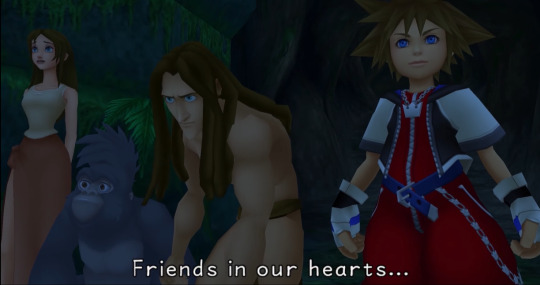
As the series has gone on, the implementation of the Disney worlds has become worse and worse as Nomura has struggled to come up with reasons to travel to them. I think you’re right that KH1 did the best with incorporating the worlds into the plot. Sora was trying to seal all the Keyholes, giving him a good reason to be in each one. He was looking for Riku and Kairi, which was a more personal goal. And then you had the seven princesses and the villain alliance. And each world contributed to the overall theme of the story.
KH CoM
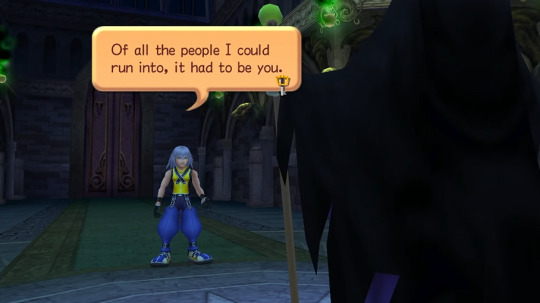
Pinocchio: Gee, Riku, don’t you have a Jiminy like I do? He’s my conscience. He’s taught me all kinds of important stuff. Maybe you just need somebody to show you what’s right and wrong.
Jiminy: Sure. You can’t shoulder all your problems alone, ya know. You must have somebody–a friend you can talk to?
In CoM, the Disney worlds were pure filler. Only existed for gameplay. On Sora’s side, the story within them was almost the exact same as it was in KH1. Even on Riku’s side, the Disney worlds were pointless. For instance, the whole Monstro level in KH3D could have happened in Re:CoM, since it’s basically reliving Riku’s memories from KH1, but having him make a different choice that time.
KH2

Iago: I wanna be a good friend, like Genie, but I can't do anything to help you. What kind of a friend is that?
Sora: Oh, no---it's not like that, Iago. Friends don't have to "do" stuff. As long as you have fun hanging out together, that's all that matters.
In KH2, the worlds are a mix of new and old. But they’re not really important to the plot. Sora’s just looking for Riku and the King, they’re not there, you participate in the movie’s plot, then move onto the next one. All the actual story happens in Twilight Town, Hollow Bastion, or TWTNW. Each world usually has a theme and a moral lesson, but it doesn’t always relate to Sora that much, so they feel filler-ish. In the second half, the organization appears in the worlds, which makes them a little more relevant to the story. But not much. They were still fun levels, though.
358/2 Days
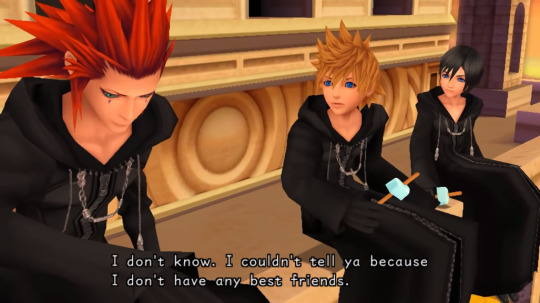
Roxas had a good reason to go to the worlds, to collect hearts for the organization. I don’t mind if the Disney worlds aren’t directly plot-related, as long as there’s character development in them. I like that they took certain worlds from KH2 that felt like filler and expanded on the main theme of them, contributing to character development, particularly for Axel. For instance, in KH2′s Agrabah, the moral lesson was: best friends don’t have to be “useful”. This idea doesn’t have much to do with Sora, though, so it felt kinda pointless to his quest.
If you didn’t need me, then I no longer held meaning. However, reality is different. It wasn’t about whether I was needed or not. If I could just connect to others’ hearts, that would be enough.
But it was implied that this idea was very relevant to Axel’s memories of his past and his best friend.
“Because they copied my powers, the Keyblade’s power, and then they didn’t need me anymore— is that it?” Roxas spat.
He couldn’t bring himself to confirm it.
“I guess you felt the same way, huh, Axel?”
At those words, something wrenched in his chest, and he could hardly breathe. No, not me. I wasn’t thinking like that. I would never. “That’s not true. You—you’re my best friend.” The words spilled out of him.
The story of Days was all about how Roxas and Xion help Axel remember his past and what it felt like to have a best friend (an idea that connects to CoM). And the Disney worlds at least contributed to that idea in a meaningful way.
“Set in a circus and playing off the story of Pinocchio, a puppet with a heart, and the Nobodies who possess no heart, we planned for a sad episode with Roxas and Xion looking for hope for themselves”.
I would have preferred Prankster’s Paradise as a world, though, instead of, say, Halloween Town. It sounds like Roxas and Xion would have developed more in that world and it would have been more relevant to the story. Plus, it would have been new. But I think Days did a decent enough job with the Disney worlds. At least Roxas learned something new when he went to them, spurring on interesting discussions with Axel about friendship, love, the heart, etc.
KHBBS
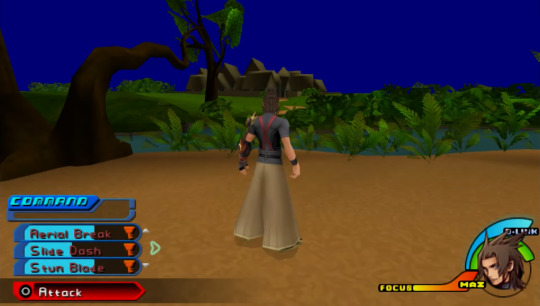
Bagheera: It was bound to happen. Mowgli is where he belongs now.
Three new characters. In each world, the character learned something new and developed slightly. The worlds were mostly new, too. I don’t have a problem with BBS’s Disney worlds. I do wish they would have kept the Jungle Book worlds in, though.
“Riku… Do you think Nobodies have a home? Somewhere we belong?” Naminé wondered.
Having a home, somewhere to belong, was one of the main themes of the Xehanort Saga.
Master Xehanort: Darkness that you channeled.
Terra: No, I succumbed to it. Just like when I stole Princess Aurora’s heart of light. I can never return home now. I’m a failure.
Terra felt like a failure, and that he could never return home. And Aqua was tasked with bringing Ven home. This world could have been really good in BBS.
Coded
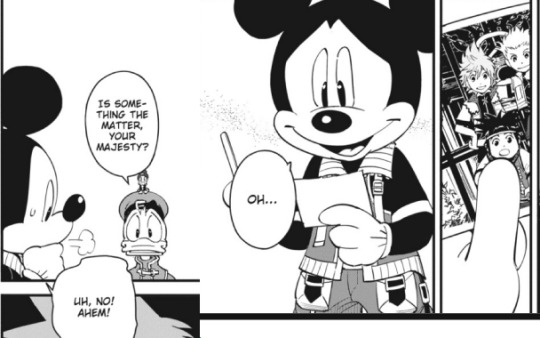
Mickey: Yen Sid… I think we’re finally close to figuring out where Ven’s heart is.
Here’s where things start going off the rails. In Coded, Disney worlds are yet again retreads of KH1, only this time they’re data instead of memories. The whole purpose of the plot was to explain why Mickey sent Sora, Riku, and Kairi that letter at the end of KH2. But you didn’t really need a whole game of travelling through virtual Disney worlds for that, especially involving convoluted ideas like data Namine implanting bug blocks in the journal or Jiminy’s Journal embodying itself as Riku (WTF?). You could have just added a scene into KH2FM+ like the above one from the manga. When Mickey saw the photo of Roxas, he recognized him as Ventus. Then he tells Master Yen Sid about it later, leading to Coded’s ending and him writing the letter.
KHUX
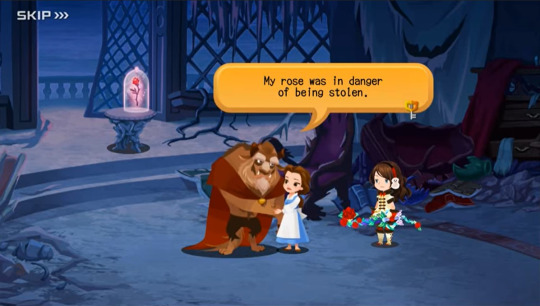
Ephemer: The worlds we visit—the worlds of fairy tales—are nothing more than holograms. You know, projections. The light we collect there is actually this world’s light. To put it simply: There are lots of worlds, right? And they’re all connected by land. But it’s impossible to go around all of them. That’s why there’s a mechanism that projects those worlds here and allows us to collect Lux from faraway lands. I’m gathering information, trying to figure out how the whole thing works. My hunch is that the Book of Prophecies held by the Foretellers is what’s creating these holograms.
The Disney worlds were extremely boring to play through. More than any other KH game, they have scenes that are just copy/pasted straight from the movies. Your main character, since they are mute, has little involvement. They do not grow, change, or develop, after any of these worlds. They have nothing interesting to say and they can barely interact with anyone (Chirithy does it for you).
And all, except for Wreck-It-Ralph, are just retreads of plots that we already experienced in other games. The worlds are digital holograms of the future generated from the Book of Prophecies. It’s all a VERY convoluted excuse to have you play through the same old plots from the Disney worlds. AGAIN. Only with a FAR less interesting main character. Since this was supposed to be just a F2P gacha with little story, it could have been excused. But since KHUX has become so important to the main story, it is inexcusable how poor of a game it is.
KH3D

Sora: I get it now. After this, Pinocchio and Jiminy’s world gets dragged into darkness, and they end up cast into the sea between worlds, along with Monstro. And then…they end up in Traverse Town, and the belly of the whale. That’s when we meet for real. It’s like Master Yen Sid said–I’m in the dream Pinocchio’s world is dreaming. And that world will never be right again until it wakes from sleep.
I don’t have any real issue with a game focusing on the mark of mastery exam, where Sora and Riku travel through Disney worlds. Riku develops along the way in a satisfying way. It’s the first time you actually go to new worlds as him. The test was for Sora and Riku to acquire the power of waking, so they had to go to dream worlds. Fantasia was perfect for this idea.
But the concept of Sleeping Worlds is convoluted and confusing. They’re dream versions of the worlds? Who is dreaming them? The Dandelions? They’re stuck in a time loop of the past? But visiting the Sleeping Worlds doesn’t rewrite the present. So, are they connected to the datascape? Again, it’s so convoluted, because there really is no reason that Sora and Riku would have to go on another adventure in the REAL world. Again, I would have preferred Prankster’s Paradise in Days. Pinocchio would be a human, it’d be set in the present timeline so no awkward dialogue, and Honest John and Gideon would be involved, giving it more of a plot.
KH3
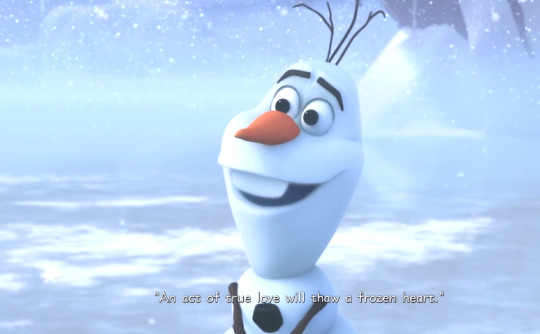
The game’s worlds could have been okay if Sora wasn’t just wandering about aimlessly. And if they had developed the power of waking better. The power of waking is essentially the power to wake a sleeping heart by connecting with it. It’s the power of love, basically. Most of the Disney worlds are about love. And also, a member of the organization appears in each one.
Dark Road
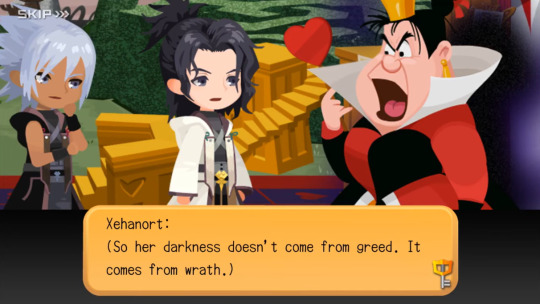
In BBS, it’s revealed that Xehanort wants to open KH to create a new world. But in KH3, he wants to reset the world. How is this different?
Nomura: The most essential part is that he thinks the current world is a failure, and wants to remake it.
I’m interested to know why Xehanort came to think that way (that the world should be remade).
Nomura: Initially, I wanted to dive deeper into the naive, untainted Xehanort who we see playing chess in the next installment (before KH3 was made), but if I did that, the dark seeker arc wouldn’t have ended (lol), so I decided to shelve it for now.
Wonderland is the only Disney world that has had a plot so far. But this was still the most interesting usage of Wonderland in the series, IMO.
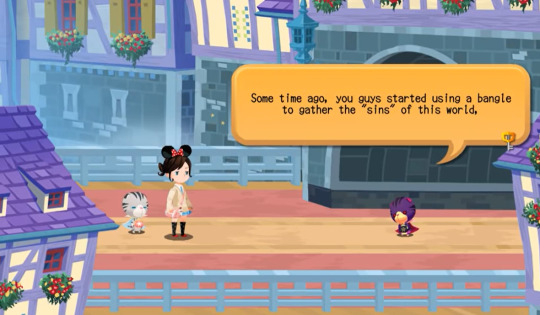
Envy (Latin, invidia): Invi Gluttony (Latin, gula): Gula Lust (Latin, luxuria): Luxu. Anger, or Wrath (Latin, ira): Ira Greed, or Avarice (Latin, avaritia): Ava Sloth, or Laziness (Latin, acedia): Aced
The Foretellers are named after the seven deadly sins.
Nomura: As I was writing the scenario for Kingdom Hearts Back Cover, I was careful so as to make each character look neither like a hero nor a villain, however in the end it seems that only Ava was received as a good girl (laughs). At any rate, if you think of the story progression as a gun, where Ava is the only one with the capacity to pull that gun’s trigger, I’m not so sure about how devoid of sin she really is…
I think there were a lot of parallels between the age of fairytales and the Book of Genesis.
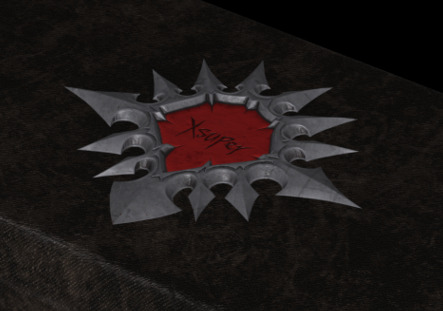
Pride (Latin: superbia) is considered, on almost every list, the original and most serious of the seven deadly sins. Out of the seven, it is the most angelical, or demonic. It is also thought to be the source of the other capital sins.
The MoM is probably really Darkness, the original sin, Superbia. And Xehanort has his Keyblade, becoming his successor. Pride was his deadly sin. He could never admit that he lost to Eraqus at chess because of his pride. In the Bible, the source of sin was the tree of knowledge of good and evil in the Garden of Eden. After acquiring knowledge of good and evil, he developed a god complex. Pride is the ultimate sin, where all the other sins originate from.
I need only play the role of a fool desirous of the Keyblade’s power.
Luxu is lust and Braig lusted for Xehanort’s power (as Luxu probably did with the MoM). The story in Dark Road is actually interesting. Xehanort is a FAR more interesting protagonist that the Avatar in Union X. As a wielder in training, he actually has a good reason to travel the worlds, and develops as a character along the way. I think Dark Road deserved to be its own real KH game, released on the Vita or 3DS a long time ago. It’s a shame it’s only a mobile game.

Anger is manifested in the individual who spurns love and opts instead for fury. It is also known as Wrath.
Pride is excessive belief in one’s own abilities, that interferes with the individual’s recognition of the grace of God. It has been called the sin from which all others arise. Pride is also known as Vanity.
Envy is the desire for others’ traits, status, abilities, or situation.
Gluttony is an inordinate desire to consume more than that which one requires.
Lust is an inordinate craving for the pleasures of the body.
Greed is the desire for material wealth or gain, ignoring the realm of the spiritual. It is also called Avarice or Covetousness.
Sloth is the avoidance of physical or spiritual work.
The story of Dark Road will likely be Xehanort encountering the seven deadly sins as manifested in Disney villains and coming to the conclusion that the world is too corrupt and needs to be reset. That is actually a decent enough plot and good justification for travelling through the Disney worlds. It’d be cool if they added new worlds. Maybe like Pocahontas, and Governor Radcliffe could be Greed, etc.
3 notes
·
View notes
Text
Fake Fic Summaries 26/?, the Five Ways Love Hurts edition (2020-04-20)
A/N: I would like to preface this be reiterating the shameful fact that I still have yet to consume any canon BnHA. All of my knowledge is entirely from fanfiction, the occasional wiki-ing, and various meta analysis posts.
I mean... I don't think that really matters considering these are all fake AU/recursive ship fics, but I just feel like it's something I should warn people about?
Anyway, here we go!
~
1) clockwork hearts (the too many gears remix)
Or, when you're in love with an android because he's so human, but that android loves some other human entirely...
... and that other human hates your beloved android because he's not the real thing.
Aka, I read clockwork hearts by OneshotPrincess and thought to myself, how do I make this beautiful and sweet fic dramatic and sad? Throw some Bakugou into the mix!
Okay, so, I would highly recommend the fic--it's beautiful and sweet and pretty quick and also this next bit is spoiler-y/won't matter much if you haven't read it.
Anyway, clockwork hearts is a TodoDeku fic in which Izuku is an android, and Todoroki is a rich boy completely enamored by this android who seems so human.
And while I cannot say whether or not it's because the android IS based off a human Izuku in the original fic, I can say that's the situation in this little brainstorm because what if that was true? And so because android Izuku is based on human Izuku that would mean android Izuku loves (whether platonically or romantically) Bakugou.
But that means Bakugou knows (and maybe loves?) the human Izuku so android Izuku is like... a despicable artificial mockery in his eyes.
So I guess first I have to figure out what the BakuxHuman!Izuku side of this fic would be--like, is who/why does Human!Izuku have an android version of him? Is he in some way incapacitated or or missing/presumed dead or actually dead?--and then, second, I would have to figure how the TodoxAndroid!Izuku path crosses with the BakuxHuman!Izuku path.
I mean, if Human!Izuku is missing then maybe Android!Izuku has the clues to find him so Bakugou is like "hey, I need your shitty robot to find my [beloved] childhood friend" to Todoroki because he doesn't even think of Android!Izuku as being sentient and Todoroki's just like, wtf no, but Android!Izuku does kind of love Bakugou and is just like. "He needs my help! Even if it's to find Human!me."
And then it becomes a begrudging trio road trip to either a) find Human!Izuku or b) give Bakugou closure on Human!Izuku's death PLUS c) fall in love???
I just love drama!
~
2) Becoming Real (not too shabby)
Katsuki has long ago put away his childish things, but Izuku's not one for giving up.
Or, in which Izuku is one of Katsuki's childhood toys and wants to become Real.
(aka, a Velveteen Rabbit/Pinocchio AU)
Vaguely reminiscent to the above brainstorm, although I don't know if this would be weird to make romantic or not. Given the whole Izuku starts as one of Katsuki's childhood toys and all.
I'm trying to figure out in this journey to become real, if Katsuki's life is just normal BnHA world (minus Izuku as a human) so he goes to UA and there are quirks etc etc. Because that would mean I couldn't make some of the other toys/beings on Izuku's journey to Realism be the Dekusquad. Like. The idea of Iida and Uraraka and Tsuyu as other toys/Jiminy Cricket equivalents trying to help/guide/keep Izuku from doing something nuts is very fun. But then would that mean they're not in class 1-A anymore? Or is this a weird Wizard of Oz situation? Or are the League of Villains obstacles for Izuku instead of being actual Villains ruining the UA students' lives?
Or... is this somehow a Izuku is actually human with a quirk but long ago something happened to Inko so he turned himself into a toy as a weird quirk defense mechanism and Katsuki took him home and both of them/just Izuku forgot how to turn back? So the answer all along is to get to Aizawa? ... but that one's kinda weird and horrifying, so I'm going to say no.
I don't know, I just thought. Velveteen Rabbit = Izuku was easy to connect but there's not much of a plot to follow through on?
~
3) Bakugou Katsuki's Guide To House Husbandry and Domestic Bliss
It's just a Way of the House Husband AU but with retired pro hero Ground Zero instead of a former yakuza. That's it.
Weirdly enough I have more semi-angsty backstory for this fluffy nonsense than actual fluffy nonsense, presumably because I was trying to figure out a feasible set up for the fluffy nonsense? So it's something like:
When Izuku and Katsuki are six years old, they are attacked by a villain made of sludge.
This is after Izuku's quirk has failed to appear, after he has been branded as quirkless and useless, but before the words become pointed and suffocating and bitter.
This is after Katsuki fell and Izuku leaped after him hand outstretched, after a false sense of inequality has been wedged between them, but before it can permanently shape a dynamic of confused conflict.
This is after their lives have been tied together, for better and worse, but before it can be horrendously tangled and frayed.
When Izuku and Katsuki are six years old, they are attacked by a villain made of sludge and saved by the number one hero All Might--it changes both everything and nothing of their futures lives.
Because Katsuki will turn this horror into determination, will become a hero that always wins--and better than All Might, he vows, staring wide-eyed at the curled form of his best friend in All Might's arms as he run, run, runs to the hospital. And Izuku will still help people with all he can give, even quirkless and one hand short.
And two decades later, as they move in together, this still stays the same: Katsuki is far and away the better house husband.
... and it's basically Izuku is some kind of engineer/doctor/physical therapist and at the top of his industry same as Katsuki who is Ground Zero and who is on some kind of injury related sabbatical and who has decided to be the Best House Husband ever.
I had some more thoughts about how, even though Izuku still admires All Might and doesn't at all blame him for the loss of his hand, that his mentor/goal in this world is the engineer/doctor/physical therapist that helped child Izuku with his prosthetic (and I came up with a name and a non-work related quirk for them, too, Akahana Tonakai who can make their nose glow and that's it. Quirks do not make them great, etc. etc.) And also some angst about how the hand that Izuku lost was the hand that he reach out to Katsuki when they were younger (should've take it when you had the chance!! he sometimes thinks, before shaking that thought away)
I don't have anything concrete tho, so... that's it.
~
4) Legend of... ???
Power, Wisdom, Courage...
Even without the great calamity, the princess of legend, or the hero of time, the triforce still remains in Hyrule waiting for those who would wield them.
Or, Katsuki was always going to be a hero, he just has no idea what to about with the weird forest spirit that has the other half of his sword.
Basically... Deku = Deku Tree from Legend of Zelda? Not that Izuku is that big old tree, but, like, maybe he was raised in the forest? Maybe it's the only name that non-forest dwellers know? I don't know. I've literally only played Breath of the Wild and, like, 20% of Majora's Mask so... the lore is not strong in me.
I kind of had an idea of, like, mixing the "canon Fantasy!AU" (which is, frankly, bewildering that that's a term that both applies and makes sense) but I don't really know the full lore of that either? I mean, maybe All Might was a powerful hero who had managed to unite all three pieces of the TriForce (at expense to his health) and when his sword was split in two and one ended up with Katsuki while the other was SUPPOSED to be waiting for its other half in the forest protected by the Deku Tree but instead Izuku was like. Hey. I can wield this to protect people and off he went and now it's kind of this chasing me, chasing you type adventure?
I was also trying to figure out the whole Power = Bakugou, Courage = Izuku, Wisdom = ??? thing. Because while I would normally be like, ah, yes, the Big Three would be Bakugou, Izuku, and Todoroki, I wouldn't necessarily say Todoroki is Wisdom? So... *shrugs*
~
5) i dream of flowers (the always fading remix)
Or, how to take a yearningly sweet and slightly melancholy fic and turn that sad dial up to eleven!
This would be a real sad remix of i dream of flowers (and they're always sad) by Seeress
The idea I have is going to be spoiler-y and it's not worth the spoiler so PLEASE read that first. Trust me, it's worth it. Actually, all of Seeress' fic is so *chef's kiss* if you're into BakuDeku. Anyway, the rest of the brainstorm is under the cut so as not to violate spoilers.
I really just wanted to lean on that ANGSTIER AMNESIA. So the remix is more... in which they can only be together when Bakugou is "Ground Zero" because Izuku's brain is literally incapable of holding memories of "Bakugou Katsuki" after the hanahaki surgery. So not only did the surgery cause retrograde amnesia (in that, all of Izuku's memories of Katsuki were taken out along with his feelings) it also causes anterograde amnesia in that, Izuku can't form new memories surrounding the person he knows as "Bakugou Katsuki." Kind of like a vaccine... or, so as to maintain the flower vibe/analogy, it's like selective herbicide.
BUT (and here's where it gets deliciously angsty) he can still form memories of the hero "Ground Zero" he just can't connect that Ground Zero = Bakugou Katsuki. Which is especially fun given that in the original fic they meet up again and Ground Zero is trying to reconnect with/date Izuku. It's not quite the level of Fifty First Dates, because Izuku CAN keep memories of Ground Zero (and like in the original fic, Izuku has been a fan of Ground Zero for a couple of years) it's just whenever Katsuki tries to say his real name that the memories/connections fail to form. Like the two identities must be kept compartmentalized. So they can have a perfectly functional relationship so long as Katsuki only ever stays Ground Zero to him.
I don't know how to get to a resolution though, or if there even is one? Because on the one hand, I guess I would love Katsuki mildly suffering in order to be with Izuku for infinity, but Izuku is also real smart and I feel like even amnesia wouldn't stop him and he's not really one to be stuck in a dilemma when he can just resolve it through sheer force of will... *shrugs*
#jacksgreyson#boku no hero academia#izuku midoriya#katsuki bakugou#shouto todoroki#fake fic summaries#brainstorm#links#rant#bakudeku#tododeku#fic remix
8 notes
·
View notes
Text
Ryan Reacts to Kingdom Hearts 3
Okay, so this is a mix of live reactions and post-world reactions. Lot of live reactions in the beginning and end, more sporadic in between. You can probably guess what I’m reacting to most of the time from the sequence of events.
Mmm dat orchestral Don’t Think Twice Needed a minute on the menu. Finally seeing it say KH3 was A Lot. HOLY FUCK WHAT A COOL INTRO The speed is the same as 0.2, with that sprint that kicks in. Will take some getting used to. The stained glass looks gorgeous though Nice touch of KH1 Sora’s jump animation changing to KH2 Sora’s Making choices again like the original. Vitality is probably health, Wisdom is probably magic, and Balance is, well, balanced. I’ll go balanced. (I’m on Proud, btw) Guardian, Warrior, Mystic. Same as the weapons in KH1. In that case, I’ll make the same choice I do there: Guardian. SORA HAS AN IDLE ANIMATION OH MY GOD BLOCK AND DODGE FROM THE START! Also this sky place is new for a Dive to the Heart (AND THOSE HOOOORNS, LISTEN TO THEM) The water looks great A four-hit combo instead of the usual three? Huh Scan from the start too Nice detail of Sora’s head angling towards the locked on target All this music sounds SO GOOD I’MMA NEED THIS SOUNDTRACK ONCE I’M DONE Ahhh that little soft version of Sora’s theme WHAT THE FUCK IS THIS KINGDOM HEARTS II.9 SHIT These Instagram-style posts on loading screens are adorable Oh damn, we get a LOT of abilities from the start. And this is on Proud! Dodge Roll, Air Slide, Aerial Dodge (formerly a Master Form ability), plus all the Flowmotion stuff Wow, THREE shortcut menus! 12 total! Wow, and a LOT more control over how allies use items. That can be very useful! Sweet, synthesis materials are back! Water is an interesting new spell. And being able to reorder the Magic menu is nice (though I only use shortcuts). Kinda glad the item art has stayed the same. Also hey, Wellspring is from BBS. And first AP Boost of course goes into Sora, as will they all. WOW USING THOSE IS WAY FASTER NOW Yooo that Underworld music with the Titans’ appearance Take a shot every time someone says “Sora, Donald, Goofy” Sora, Donald, Goofy counter: 1 HERCULES HAS JOINED THE PARTY “Team Effort: Always start battles with a team attack command.” Damn, what are those that this ability is FIFTY AP?! (Are team attacks that move we saw Sora and Goofy do in a trailer? The throw?) I like that tutorials are playable at any time Also I was worried Save Points might not return with that auto save message at the start ALSO THIS IS NIGHT OF FATE PLAYING IN THE COMBAT TUTORIAL Ooh, Panacea art is nice. (Panacea has only appeared as a command in games like BBS and re:coded, so it hasn’t had art before) *reads Ability Ring* Damn, if 10 AP is a SMALL boost, I can’t imagine how expensive abilities are gonna get (well, Herc does have that one 50 AP ability) Ultima Weapon returns, looks like Synthesis recipes are based more on collector’s goals than finding them. Looks like there’s 60 synthesis materials, sounds about right. Ooh, synthesis item rarities, types: soothing and pulsing are from BBS, writhing, betwixt, sinister are new. Looks like everything goes in Shards, Stones, and Gems. Ooh that’s a lot of Heartless. Hey when is Jiminy gonna show up? Gonna need to complete that Journal again. Oooh battle music has bits of the old Coliseum battle music. Sora, Donald, Goofy counter: 2 Environmental fire damage followed by Sora’s butt on fire limiting my actions. Neat. Okay, these have been live reactions so far, but I’m gonna stop doing that because it’s slowing my progress. “What the heck is Rage Form?” “OH. OH THAT’S A THING.” I keep seeing hidden Mickeys, I bet those are gonna be a thing with the camera once I get it. Also damn are they giving me a lot of ingredients for the cooking minigame I can’t play yet. So the biggest thing I’ve noticed about the new combat is that because they give you so many really powerful abilities (grand magic at higher levels, formchanges, attractions, team attacks) that are all basically free (are you hitting things with your keyblade or magic? Can you hit this specific enemy once? Can you wait for your teammate to give you a prompt?), the number of enemies in each fight seems to have SIGNIFICANTLY increased from previous entries. KH2’s level design this is NOT. Lots more nooks and crannies to search. Me approaching the gates of Olympus: “Is this Anor Londo?” Yay nostalgic Coliseum music! And oooh little environmental puzzles are back! Like from KH1! I forged Goofy a new shield! Aaaand playable Riku. I have no idea why they were so dodgy about the second playable character. This is only the third time Riku’s been playable. Anyway, gotta fight the Demon Tower again. Damn, Riku is WAY stronger than Sora right now. Wish I could have read his abilities (and moved shortcuts). Nice emulation of the death screen. Also hot damn, is that Repliku talking??? I guess Riku’s “other me” really could be Repliku. Awwwww yeah, Lea’s getting new clothes too! YEAH JIMINY! “Dream Heartbinder” So Heartbinders must be this game’s summon gems, and this one lets me use Dream Eaters. SORA’S THEME IS THE RINGTONE!!! Ienzo’s here, with a bit of OrgXIII music from CoM. HOLY SHIT THE GUMMI SHIP IS THE BEST IT’S EVER BEEN UPGRADEABLE KEYBLADES?! I guess that makes sense, considering they all have different formchanges. They want all of them to stay viable throughout the game. OH MY GOD, DEMON TIDE HAS SO MUCH HEALTH I guess the bosses have to with all these powerful attacks I have Does Hayner have a new voice? Olette sounds different too. Checked the wiki, all three have different actors. Pence sounds closest to his original though. So judging by the Dusks and Snipers, no more enemy-specific reaction commands. The Ducklings sell Gummi blocks now?? Huh. Whoa wait, the road out of Twilight Town’s Tram Common leads back to the world map? Can I NOT go to the clock tower in this game?? Man, Twilight Town felt really small. Hope the remaining worlds don’t, though they’ve certainly seemed significantly larger than the two I’ve been to so far. Also, totally called the Lucky Emblems, though I’m gonna keep calling them hidden Mickeys. I think Tou Story is my favorite world. Granted, I’ve only been to three, but still. The Gigas are super fun, Woody and Buzz look amazing, and I can’t stop whistling/humming along! AHHH CREEPY DOLL Lol, the Verum Nox poster even has a Square Enix logo. First death, the Gigas battle in the video game. GOD DAMN! WOODY dropping an amazing “The Reason You Suck” speech to Xehanort! “Unless you’re in the ~real~ Organization too? Good for you!” Damn, Sora! Also love hearing that music from Chain of Memories every so often Glad flowmotion’s jump isn’t as level-breaking as it was in DDD. Same goes for the attacks. Wow, so Rapunzel permanently leaves the party. Was wondering they’d just give her a different moveset like with Mulan/“Ping”. This is the first time a character permanently leaves your party. And of course, Marluxia. Who I didn’t think could or would return. And Vexen who rejoined willingly, which is, man. Not something I’d have done. Both Norted of course. And was Saïx missing his scar? Maybe he’s just Isa now. I could tell it was Unversed, and Flood specifically, in that first Monstropolis cutscene just from the sound of them spawning. That’s how I know I’ve put a lot of hours into this series. Monstropolis feels the most linear so far. Arendelle’s ice labyrinth is awesome, the level design gives me some light Dark Souls vibes. I like how there’s zero explanation for Sora, Donald, and Goofy being able to breathe underwater in The Caribbean. And by that I mean I would have liked even just one line to explain it. The ship combat isn’t as good as AC3’s and AC4’s, but it’s still pretty good for a one-world mechanic! The ship is a LOT more responsive than the AC ones. And damn, is this world open. Okay, San Fransokyo is gonna be a pain to search for chests and Mickeys. PRESS TRIANGLE TO SORA IS THE BEST REACTION COMMAND I HAVE EVER SEEN Jiminy telling people about summaries on the gummiphone is Square Enix saying “IF YOU DIDN’T PLAY THE GAMES, READ THE FUCKING SUMMARIES” Giant battle at the start of Keyblade Graveyard was cool, but hurt the frames, especially on the fake shadows. And just as I was getting hyped at the possibility of having Riku and Aqua as party members. Oh hey, just realized Riku’s keyblade has a Mickey keychain now too. “And so, as legend foretold, darkness prevailed and light expired...” “Your hearts will be torn from your bodies” “To move through time, you must leave your body behind.” THE FINAL WORLD?! Wait, Sora’s been here MULTIPLE times?? Okay, so the star talking about the person who’d miss them, whose heart has been taken by another’s? Strelitzia? Talking about Lauriam? Love and hate? Going back for fight after fight? Hm. Cloud or Sephiroth maybe? (Longshot, but it doesn’t sound like a khux character, or anyone else) Identical pair? There’s no twins in this series. Like walking alongside a mirror... maybe it’s not an literal identical nature? Same clothes, same food, maybe Xion?? “Nothing left to teach you”? Damn, that’s not much to go on. Maybe Eraqus’ and Xehanort’s master?? “Just friends... stepped back” Skuld maybe? “I’m gone... they’ve added another member” Could that be Xion? Wait, no, how could Xion be here, she’s still within Sora’s heart. Are these actual named characters we’ve met before? Or not? The one who was defeated and supposed to fade... Repliku?? But he’s with Riku now... Someone searching for their Papa??? Most of the characters in this series don’t have parents at all, so my only guess here is Pinocchio?? No way a Disney character ends up here though. I don’t think all of these are characters we know. Someone holding onto a sliver of memory, and a servant?? Yeah, these could all just have been ordinary people. Naminé?! What happened to Kairi??? Okay, so the darkness split them. KAIRI IS KEEPING SORA FROM FADING AWAY OH MY HEART “GO TO HER” SHE SAYS "That's not the official thank-you!" Lol Damn, this area is fuckin huge, why is it so huge?? A PORTAL?! A DDD PORTAL HERE?! Well this place is rad. I better see that weird Darkside at some point here OOOOOHHHHHHHHHHH OH IT ROTATES THAT'S FUCKIN SICK God damn, this game's got some of the best level design of the series! Is... is this OUR Chirithy? “He doesn’t remember the past”? Although I guess it could be Marluxia/Luxord/Demyx’s too. Or Ven’s. My bet is that it’s Ven’s. DID SORA JUST TIME JUMP BACK A FEW MINUTES??? Aaaand did nothing different. So now we’re world-hopping like we did back in End of the World. OH WHAT IS THIS DIVING INTO STATIONS TO PICK A WORLD?!?! YOOOOOOOO Just Kairi and Lea are left. Haven’t hit San Fransokyo or Twilight Town yet. Guess they must be in those two. Last one is San Fransokyo. Lea must be here. Kairi’s probably gonna be the last. “Traversing hearts to reach worlds” That must be what I’ve been doing here. Not jumping between worlds, jumping between HEARTS. Was Sora just considering telling her he loves her? He should have. Wait, am I back in time? This already happened... OH SHIT! THE LINGERING WILL IS HERE! EPHEMER! OHHHHHHH HO HO WOW! OHHHHHH FUCK! YOOOOOOOOOOOOOO! Congrats to all the lucky people who got their names in the game! PRESS TRIANGLE TO UNION X GIANT SHADOW MASTER XEHANORT IS TERRIFYING I like how Axel is holding his keyblade by the guard instead of the handle OH SHIT MASTER YEN SID! YOOOOOO! Okay KH3, I want to fight thirteen bosses now, you hear me? DAMN that Ancient Light finisher on Starlight’s Second Form is STRONG YOOOOOOO THREE BOSSES AT ONCE??? (I really hope this is as tough as they were before, but seeing as Xemnas was harder in 1 than in 2, doubt it) Went to help Mickey first, so I’m taking on Marluxia, Luxord, and Larxene Oh come ooooon, I barely got to fight them! Luxord’s out, 12 to go OH SHIT THE OTHER TWO Larxene’s done, 11 to go. With XI conveniently up next. Marluxia’s defeated once again. 10 left. Hey whatever happened with that comment of their ancient keyblade legacy...? Xigbar... might be gone? So maybe 9 left. Dark Repliku is defeated, and light Repliku gave himself up so the Replica could be used for Namine. That’s sweet. 8 left. YO actual time of day change! I like the door switches. Nice having little environmental things like this. Hm, Kairi and Lea one way, Aqua and Ven the other. Well that’s no contest, gotta go back up my girl Kairi! Mysterious new hooded figure??? Oh. Oh no. I think it’s Xion. D: Yeah. It’s her. *Xion stops Xemnas “YEYEYEYEYEYEYEYEYEYYE YEEEEEAAAAAAHHHHH” *Roxas shows up “OOOOOOOOOOOHHHHHHHHHHHH FUCK” THE WHOLE GANG’S HERE YOOOOOOOOOOO Shout outs to Ienzo, Ansem, Vexen, and Demyx for helping Roxas return! WHY THE FUCK IS KAIRI GETTING KIDNAPPED A-FUCKING-GAIN, NOMURA WHY WAS SHE EVEN TRAINING, FUCK Okay, so Kairi and Lea/Axel are out, BUT ROXAS AND XION ARE IN OH HOLY SHIT, SORA SQUAD FORM UP!!!! I HAD TO STOP AND LISTEN TO THE MUSIC FOR A MINUTE It’s all three of their themes! (Plus a bit of Another Side) THIS IS THE HYPEST SHIT Aww, Saix’s death mirrors Xion’s. AND THE SEA-SALT TRIO REUNITE! Saix is out, 7 left. Xion turned, 6 left. Vanitas fades again, 5 left. I know some people had hoped for a heel-face turn, but I knew it wasn’t likely. WHAT TERRA’S HEART WAS IN ANSEM’S GUARDIAN THIS WHOLE TIME. THAT THEORY WAS RIGHT! Terra-nort’s back to just Terra. 4 left. Just wanna say, I love that it’s Sora who gets to turn the tides of all these fights. Who’s dull and ordinary NOW, huh?? AND he’s still going! Oh boy, time for a triple Xehanort fight! UMMM NINE KEYS (but why are they No Name and not the X-blade?) OOOOOOOHHHHHHH THIS BLEND OF ANSEM, XEMNAS, AND YOUNG XEHANORT'S THEMES Guardando Nel Buio, Darkness of the Unknown, and Impeto l’Oscurito 1V3 ME, I'LL TAKE YOU ALL ON Young Xehanort returns to his time. 3 left. I like how we all agree to pause the fight whenever someone falls. Xemnas fades. 2 left. Ansem as well. Just 1 darkness left. WHAT THE FUCK, KAIRI NOOOOOOOOOOOO AH SHIT HE’S GOT THE X-BLADE AH SHIT HE’S GOT KINGDOM HEARTS Oh hey, everyone’s caught up. Donald: “You can’t do anything without us, Sora.” Me: “Donald, shut the FUCK UP.” Xion: “Kairi will be alright.” Me: “OH THANK GOD” Scala ad Caelum. Stairway to Heaven. It looks like a proto-Land of Departure. But the music is Case of the Foretellers from X Back Cover. Could this place and Land of Departure once have been Daybreak Town? Damn, Dark Kingdom Hearts is over the ENTIRE Keyblade Graveyard now Spooky twelve figures are spooky Why do they have the Organization’s weapons?! I love this return of Destati though They all had a shared HP bar? Scala ad Caelum’s world icon is kinda shaped like a heart Oh wow, full Inception Weird hearing Rage Awakened without the Lingering Will here “There is one sky, one destiny!” “DEEEESTAAAATI!” Ohhhhh shit Shout out to the heart in the floor design though And the figure in the middle has 7 points Classic Xehanort pose from the KH2 secret ending Aaaaand now he’s got ANOTHER Kingdom Hearts! GREAT WHOA HE FORCED ME INTO RAGE FORM DESTATI IN FULL FORCE WHAT A RAD FINISHING BLOW! The canon death screen, the heartbeat, Donald and Goofy calling from my controller! ONE BIG BLAST! So Xehanort sees himself as some sort of white knight? A templar to guide the masses with an iron fist? Yeah, no dice dude. Sora’s right, not your choice to make, and destiny is beyond your control. So Eraqus really WAS with Terra all this time. MARK HAMILL IS BACK!!! Xehanort just hands it over, huh? Wow, closure between Eraqus and his apprentices after all these years Eraqus and Xehanort mimic Sora and Riku from KH2, and pass on. Go get her, Sora. HIKARI ORCHESTRAL Ven met his Chirithy! Lea’s finally wearing his new outfit. Aw, Xion looks good too! And Isa’s here! Naminé is back too! And I bet the Namine/Riku shippers are happy! AWWW They’re all hanging out at Destiny Islands! Look at them all being friends!!! THERE THEY ARE! WHAT THE FUCK WAS THAT
Epilogue: XIGBAR HAS BEEN LUXU THIS WHOLE TIME?! WHAT WHAAAAAAAAAAAT?! You know while watching Back Cover I was like “Man, the Master of Masters really talks like Xigbar for some reason.” BOY DOES THAT MAKE SENSE NOW So what was it about Ava’s role with the Dandelions that led to her absence here? AND WHAT’S IN THE GODDAMN BOX Is it a Book of Prophecies? Something else entirely? In any case, I doubt Maleficent and Pete would be able to get it away from them all. Secret Ending, “Yozora”: Ooh, “Another Side, Another Story” vibes right off the bat. SORA! And... Riku? Well this is just Japan. Wait, the guy from Verum Rex? And a black coat, who’s probably Xigbar/Luxu or the Master of Masters? After watching, a friend informed me that Riku is in Verum Rex. And Sora’s dead. Cause he’s in TWEWY’s version of Shibuya, since that one building said “104.” But which one is the black coat in? It could be the Master of Masters dead, in Sora’s world. Or Xigbar/Luxu, still watching things.
I have no idea what comes next. But I am excited.
8 notes
·
View notes
Text
In Defense of Disney's Captain Hook: A Not Wholly Unheroic Figure
With the recent popularity of ABC's hit show Once Upon a Time, the classic view of fairytale villains as irredeemable bad guys has been turned on its head, and while some of our favorite baddies like Cruella and Dr. Facilier remain fairly true to their original Disney counterparts in appearance and personality on the show, others have gotten such a complete makeover that they are hardly recognizable as the same character they are supposed to portray. Among those given the latter treatment is fan favorite Killian Jones, a.k.a. Captain Hook. In a day and age when Jack Sparrow is the first fictional pirate who comes to mind, it's no surprise that the show's creators decided to embrace the guy-liner and black leather-wearing sexy bad boy approach to the character, but while this creative choice has had the effect of garnering fans' attention, it has also had the unfortunate effect of turning the original character into something of a joke. While Killian is viewed as a well-developed sympathetic character with the potential for redemption, Disney's original version of the character tends to be seen as little more than a straightforward comical villain with little or no real depth. As a fan of the original Disney version of the character, however, I'd like to argue that from the very beginning, Disney's Hook was always intended to be a complex, likable villain and continues to be portrayed as such in modern Disney media. My argument is as follows:
Hook's original creators, including author J.M. Barrie, producer Walt Disney, and voice actor Hans Conried loved the character.
The original author of Peter Pan, James Matthew Barrie—who significantly gave his own first name to the pirate captain—is quick to remind the audience that despite his flaws, Hook “was not wholly evil; he loved flowers...and sweet music (he was himself no mean performer on the harpsichord)....” When Walt Disney decided to approach the character, he quickly realized that a villain with such a soft side would appeal to the viewers and instructed the animators to alter the original ending of the story, having Hook chased off by the crocodile but still clearly alive because “the audience will get to liking Hook and they won't want to see him killed.” Hans Conried, who served as both the voice-actor and the live-action reference model for Hook's character design, also had a fondness for him, stating that “He's a much maligned character. If you read the lines with any sensibility at all, you must have an animus against Peter Pan who could fly, and took outrageous advantage of this one-armed man. Hook was a gentleman. Pan was not. His behavior was very bad form.”
His motivation as a villain departs from the standard and immediately sets him up as a sympathetic character.
Whereas many of the traditional Disney villains are motivated by greed, envy, the desire for power, or revenge for a petty slight, Hook departs significantly from the norm in that his motivation stems from severe physical (and arguably psychological) trauma suffered at the hands of the supposed hero. While we are never told the exact circumstances under which the hand loss occurred, Hook has a legitimate reason to hate Peter Pan that runs much deeper than mere jealousy or megalomania. In fact, in his opening scene with Mr. Smee, Hook concedes that even such a crippling injury alone would not have warranted his hatred; rather, it is the fact that Peter gave the hand to the crocodile, causing him to live in a constant state of fear (and the boy's tendency to exploit that fear), that pushed him over the edge.
He has a multifaceted, well-developed personality which humanizes him for the audience.
In various interviews animator Frank Thomas has discussed the disparity between the personality storyman Ed Penner and director Gerry Geronimi envisioned for the character and the resulting difficulty he had in designing the version of Captain Hook that we see in the finished film. One viewed him as a foppish dandy of a fellow while the other envisioned a much darker, more frightening man who readily used the hook as a weapon against his enemies. This difficulty was further complicated by the fact that action-scene animator Woolie Reitherman—who was responsible for drawing Hook's interactions with the crocodile—wanted to bring a level of comedy to the character which somewhat clashed with his depiction in more serious scenes. The final result was a villain unlike any other Disney had created at the time—a villain who was by turns both fearsome and fragile, dangerous and debonair. Many of Disney's earliest films focused more on the new art of animation than the art of developing well-rounded characters, resulting in very black and white idealized heroes and villains. With Hook, Disney crossed a line into the morally gray territory, resulting in a sympathetic yet sinister character whose moments of weakness would endear him to audiences while his wickedness simultaneously appalled them.
His physical and emotional issues are highly relatable.
Ironically, despite the obvious mention of the prosthetic in his name, we tend to forget that Hook is technically disabled (by our “hero” no less!)...and that physical disability comes with a host of other issues, some of which are trauma-related. In addition to the crippling anxiety we see displayed on-screen, other Disney media indicate that he also suffers from high blood pressure (Kingdom Hearts manga), depression (365 Bedtime Stories), and low self-esteem (Jake and the Neverland Pirates). These are very real everyday issues that we can all relate to on some level either through personal experience or through someone we know.
The dynamic he has with Mr. Smee is unique among Disney villains and sidekicks.
Disney sidekicks—while often providing exceptional comic relief for the audience—are not always necessary for the hero/villain to stand on their own. Many early villain sidekicks, in particular, are given very little personality and some (Diablo in Sleeping Beauty and Gideon in Pinocchio, for example) don't even have any lines. While the sidekick to the primary villain often relies on his/her master as the brains of the operation, the primary villain usually has little need for their companionship. They are expendable resources whom the villain could easily replace or do away with altogether. Hook and Smee's relationship is different in that neither character could properly function alone; Smee relies on Hook for leadership and direction while Hook heavily depends on Smee for emotional support. Further, Smee—unlike many villain sidekicks—seems to genuinely care about his captain's well-being, and Hook recognizes and appreciates this, if only subconsciously. Despite being frequently irritated by his sidekick's apparent incompetence, Hook—a man who doesn't hesitate to shoot his own crewman for singing badly—never legitimately threatens Smee, resorting to raising a fist or giving a smack with the blunt side of his hook to show his frustration rather than taking a swipe at him with the more dangerous side of the claw. The crew, too, recognize Smee's privileged ability to speak his mind plainly to the captain without fear of serious repercussions, showing obvious disdain for him. One character is rarely ever seen without the other, and for good reason—neither one is capable of standing alone, their on-screen chemistry likely a result of the fact that animators Frank Thomas (Hook) and Ollie Johnston (Smee) were real-life best friends.
In the more lighthearted Jake and the Neverland Pirates series for Disney Junior, the characters' relationship is further expanded into actual camaraderie, and the two pirates play off each other extremely well in what voice-actor Corey Burton (current Hook) has described fondly as a “vaudeville comedy routine,” crediting the success of their dynamic in the show to his own friendship with fellow voice-actor Jeff Bennett, who performs as Smee, the relationship of the men behind the characters once again bleeding over into their fictional personas with the best possible results.
He occasionally displays qualities typical of a Disney hero.
While Barrie notes in his book that Hook is a “not wholly unheroic figure,” Disney's original film did little to show this side of the character. However, subsequent portrayals of the captain in various media indicate that this villain has the potential for moral growth. For example, in a deleted song from Return to Neverland, one of the pirates mentions Hook taking him in when he was a child. Another example of such benevolent behavior occurs in Epic Mickey: Castle of Illusion; at the end of the game when the illusion is broken and characters are saying their farewells to Mickey, Hook actually apologizes for his behavior while he was out of sorts, suggesting that although he is quite willing to fight anyone actively siding with Peter, he generally has no qualms with other Disney heroes and is capable of being civil and even polite to them. Additionally, in the Kingdom Hearts manga, Hook actually saves Peter (admittedly because he wants to have the pleasure of taking out Peter himself, but it's something, at least). Furthermore, in the preschool series Jake and the Neverland Pirates, Hook occasionally partners up with the main characters and in most instances, though he's a bit of a bully, ends up doing the right thing when hard-pressed to make a serious decision so long as Peter isn't around. In the episode The Legion of Pirate Villains, he even proudly proclaims to the main cast's common foe, “I am no mere villain. I am a villainous hero!” This concept of Hook as a sort of anti-hero was even hinted at in a line-up of character products known as the Disney Adventurers franchise sold at the Disney Store between 1999 and 2004. This franchise, originally intended to be the more masculine counterpart of the Disney Princess line, featured Hook as the ONLY villain apparently fighting alongside heroes including Tarzan, Aladdin, Hercules, and—astonishingly—Peter Pan.
TL; DR – Captain Hook is a highly complex, relatable character who deserves his place among the most iconic Disney villains. Walt and others who were critical to the development of his character loved him, and you should too.
#disney#disney villains#captain hook#disney captain hook#disney peter pan#peter pan#jm barrie#frank thomas#walt disney#corey burton#hans conried#jake and the neverland pirates
69 notes
·
View notes
Text
OK, so, the specific issues I have with the D20 tagging system first, then afterwards I'll talk a bit about content/trigger tags in general and how I'd go about it personally. To this point I am not specifically tagging this post with content warnings, but be aware I will be speaking frankly about potentially triggering content.
With the understanding that I have no particular fear of blood, the hemophobia examples are all tamer than what I'd consider not even horror-standard, but D&D-standard. It's literally like "there are old bloodstains; there is writing that appears to be in blood".
Far worse is that hemophobia is tagged for the first two instances in this episode, and then not tagged for later and arguably more graphic mentions of blood and gore, so if someone is actually using the timestamps to mentally brace for, or even worse, skip those instances, they will then come across multiple, worse references to blood later on, and possibly with less context.
The "unwilling transformation and mind control" tags, meanwhile, are, to be honest, laughably misguided. Three characters are established in the first episode to be in some part unwillingly transformed (Pinocchio, Red Riding Hood, Gerard aka the Frog Prince); and this is a fairy tale/nursery rhyme horror setting in D&D. If you are not expecting transformations, I do not know what the fuck you are expecting. Unwilling transformation will be a constant and unavoidable theme throughout this series. If it is an issue for you - and it's a valid issue to have - then you will need to either make sure you're in a headspace to watch this series, or you will need to skip this series. Similarly, mind control is similarly a constant theme in D&D. It's fine if it is upsetting to you; but if it is, actual play may not be your genre.
Now, more general considerations, with Neverafter used for some examples:
The way I would personally approach content warnings is as follows:
If it is something that is genuinely skippable, and likely to cause a severe physical reaction in a number of people (eg: strobing/flashing lights, graphic retching sounds), a time stamp is appropriate.
If it is something that is a fairly common trigger and is atypical, or at least not assumed, of the genre, I would tag at the episode level (eg: the childhood abandonment in episode 1 is not an unreasonable tag although it's kind of pushing it given, you know, fairy tales, but it is odd to time-stamp it).
If it is something typical of the genre and central to the series, I would put it as a series-level trigger, and perhaps list it for each episode. This is, again, explicitly a horror setting for fairy tales and nursery rhymes, played in D&D 5e. It should not be necessary to tag for blood. There is blood in D&D. There is blood in horror. Mind control is also already somewhat pushing it, given, as mentioned, the prevalence of control spells within D&D. Unwilling transformation is similarly something I think a reasonable person would suspect simply from the fact that the Frog Prince is a main character.
It is reasonable to state that there is specifically body horror and self-mutilation, but it should be made clear this is series-wide. I also, for what it's worth, find it somewhat egregious to tag for what is the Grimm version of Cinderella. Several of the transformation/mutilation tags refer to what is a fairly comedic and non-graphic retelling of the Cinderella story (the mice being transformed into footmen and the stepsisters cutting off parts of their feet to fit into the shoe), leading to a really off tonal dissonance.
One thing that struck me with a past D20 season, A Crown of Candy, as a similarly strange content warning, was that an NPC's (interrupted, no less) hanging was warned for, in a high medieval/low fantasy setting (ie, hanging is very genre typical); but the fairly graphic character deaths were not warned for. For what it's worth I think none of these should be warned for, as all were very genre typical both for "Game of Thrones But Food", and "D&D 5e", but warning for one and not the other was even worse.
It is also worth noting for all of the above that this is D&D and there are few visuals provided. People who have issues with visual depictions of blood, etc, may not have similar ones for verbal descriptions, and that should be taken into account.
In short: your goal should be to warn people if there is something unexpected in the context of the genre and medium. If it is expected, you should trust them to understand that. Timestamped warnings should be used very sparingly, in that episode-level allows people to be aware for the whole episode whereas timestamped sets a nearly-impossible expectation. It also carries an implication that these moments can perhaps be skipped, which is often misleading.
The other thing about content warnings is that while you cannot please everyone, and people will have complicated and unforseen triggers (and those people will often know how to work with said triggers), what you don't tag for among the common triggers is very notable. I have found a lot of CW lists provide a lot of emphasis on the physical and tangible, and do a very poor job when it comes to the mental, and this is, frankly, a glaring red flag. I can elaborate if needed, but I have personally - especially in fantasy and D&D spaces - seen content warning lists that were, frankly, insulting in how obviously they did not confer with people of my ethnicity/with my particular mental health conditions and jumped to inaccurate conclusions. Content warnings are not, actually, a case of "something is better than nothing" because of how badly a misguided list can affect someone. Saying nothing more "this is the horror season, viewer discretion is advised" would, in my opinion, have been a better choice for D20.
oh my god I'm going to make a post after I finish the episode but actually the CWs for episode 2 of Neverafter are like...the first episode was "eh this is a tad excessive" but this is actually like, at a level I could best describe as "inadvertently insulting". It's like, almost on par with the egregiously bad fan-led project for CR except it's theoretically done by professionals.
45 notes
·
View notes
Text
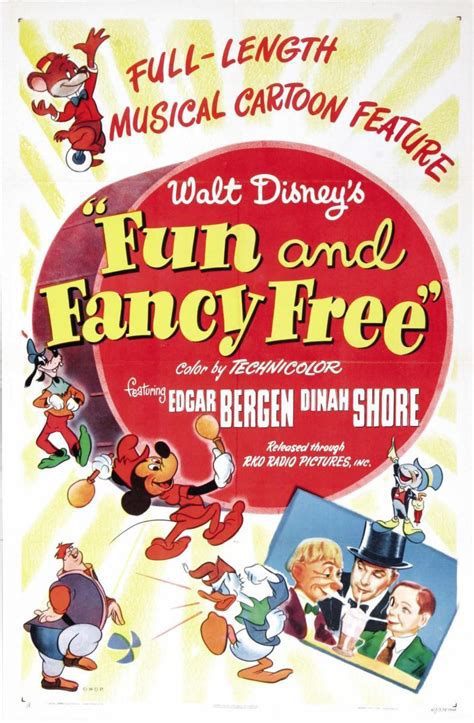
Sigh, poor package features, why does nobody like you? Why is it that internet reviewers and Disney critics and fans always seem to give you the shaft? Is it the minimized animation budget? The effort towards story and character that was forcibly driven towards wartime propaganda over actual films? The deviation of a traditional three-act structure in favor of a string of unrelated shorts woven together by a loosely connecting theme or narration? Well in a manner of speaking, it’s a combination of all three. For one thing most people I know prefer to sit down and enjoy a movie that has one uninterrupted story. And yes there are a good number of films, great ones, in fact, that play around with how the story is presented, but as of writing there’s yet to be an audience or even a filmmaker clamoring for an animated equivalent of something like Pulp Fiction.
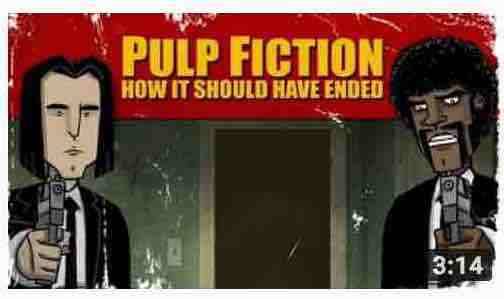
In theory.
And of course the major factor in all this is the time period in which these movies were made. I’ve already talked about this in my review of The Adventures of Ichabod and Mr. Toad but for those not on the uptake, THERE WAS A FREAKING WORLD WAR WHILE THIS WAS GOING ON. Disney couldn’t afford to do something on the scale of Pinocchio or Fantasia or even Dumbo because his best animators were A, drafted out to fight, B, struggling to work with what little resources they had when the government was also pushing them to remind the public to buy bonds, or C, kicked out because of the disastrous animators’ strike of the early ’40’s. Projects with linear narratives that were considered big scale like Alice in Wonderland, Peter Pan, and Lady and the Tramp were put on hold for virtually a decade. The best they could do was package a bunch of fun little shorts together because releasing them individually wouldn’t bring in as much desperately needed revenue as a full feature would.
And who says these shorts are bad? I don’t! At worst they’re fluffy little time fillers, but at their best they can hold their own with the big leagues of Disney animation. Again, going back to my Ichabod and Mr. Toad review, Disney’s Legend of Sleepy Hollow is the first thing I and a good many others think of when the story comes to mind. I also have the advantage that a lot of people today sadly don’t in that I grew up with virtually all of the package feature shorts in one way or another, either through individual VHS releases or on the Disney Channel as part of shows like Mouse Tracks, Donald’s Quack Attack, or the DTV music videos. It would be years until I saw them all as they were meant to in order as one full film, but blame Disney themselves for that. It’s a Catch-22 situation when it comes to their forgotten films; Disney sees there’s not much public interest in these old movies and so holds out on releasing them for as long as possible, while the public notices Disney never getting around to releasing these movies and think it must be because they’re not worth their time. So nobody wins and we all get smothered under another avalanche of Frozen dvds.
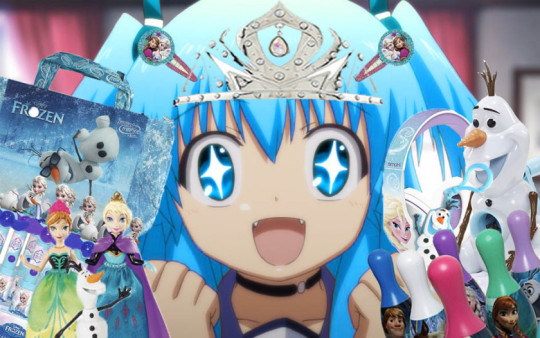
“FROZEN??!!! FROZEN FROZEN FROZEN!!!!!”
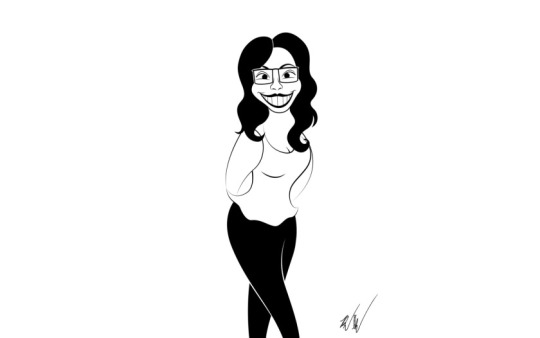
“No! Go home! You’re drunk!”
As of writing there’s only two – count ’em, TWO – Walt Disney Animated Classics that have yet to be released fully on Blu-Ray, and they’re, you guessed it, package features. “Make Mine Music” and “Melody Time” to be precise. You wanna know how old the dvds for them are? The advertisements that play before the main menu are for The Tigger Movie and The Little Mermaid 2. That’s THE YEAR 2000. NEARLY TWENTY YEARS AGO. And the only reason why today’s feature “Fun and Fancy Free” got on blu-ray is because the higher ups at Disney decided to combine it with Ichabod & Mr. Toad. So now we have a package blu-ray of two package features (three if you count The Reluctant Dragon which is also on there). It’s Package-ception, if you will. BWOMP.
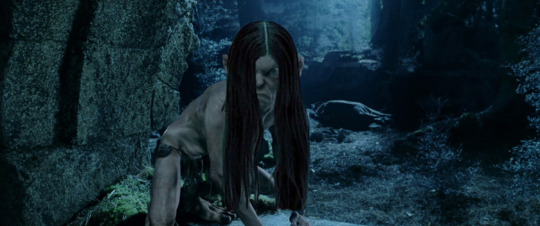
“She’ll get around to the actual review any minute now, folks.”
Back to the topic at hand, World War Two was finally winding down and the country was in a state of elation from having their boys return home after tearing the Axis powers a new one. Walt Disney had ideas for two full-length features, one inspired by a short story by Sinclair Lewis (I’d say based on but it barely resembles the tale that’s printed) and the other a take on Jack and the Beanstalk starring Mickey Mouse. Neither of them were able to get the treatment he wanted due to story issues and because the first thing to go during wars and Republican administrations is money for the arts. So he compromised by bringing them both into one movie with each of them sharing a half. Looking back I would have loved to have seen what an hour-length or even 75 minute version of Mickey and the Beanstalk would have been like because for all its flaws I enjoy it that much, and I’m tired of holding my breath waiting for Disney to do SOMETHING with “Gigantic”. Bongo on the other hand, I can’t see as anything other than a short, but that’s not a jab at its quality. Yet how do both stand up as a feature? Does it live up to what its title promises? Let’s find out.
After the main title song (which sounds like the opening theme of a variety show from that decade), we get Jiminy Cricket from Pinocchio going about his merry way in somebody’s house singing “I’m a Happy Go Lucky Fellow”. This was actually a deleted song from Pinocchio meant to be sung by Jiminy, so it’s good to hear it sung here. It proves the old adage about ideas at Disney is true; things are never thrown away, just put aside for someone to find and use later.
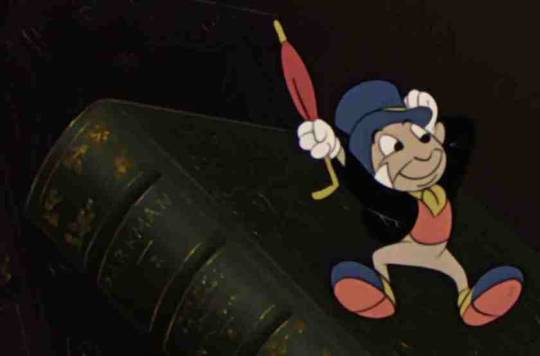
Wait, that book, is that…Darkman?! Whoever owns this library has good taste.
After startling a goldfish who resembles Cleo from Pinocchio, Jiminy concludes the fish suffers from too much anxiety and tries to reassure her by showing her a newspaper full of headlines that amount to “doom imminent, we’re all gonna die” (ah, the New York Post never changes). He explains that everyone’s been playing Nostradamus for years saying the world is going to end tomorrow but you can’t go around thinking like that. Que sera sera, whatever will be will be, you get the idea. I get where Jiminy’s coming from, I truly do, but it’s hard to back up his philosophy when he’s using real current problems as examples to ignore.
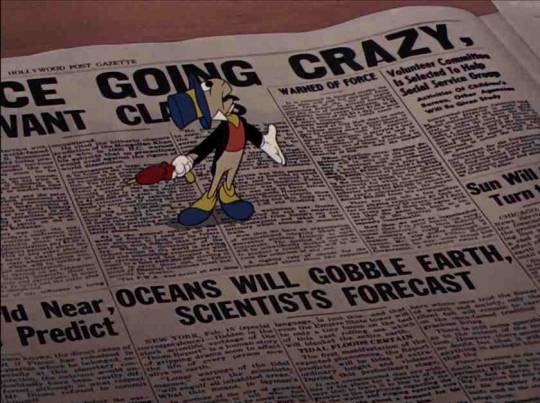
See what I mean?
Jiminy runs into a hungry cat and hides out in a child’s playroom where he bumps into a sad-looking doll and teddy bear. Assuming that all toys must be like his buddy Pinocchio he takes on the role of conscience yet again and tries to help them with their problems.
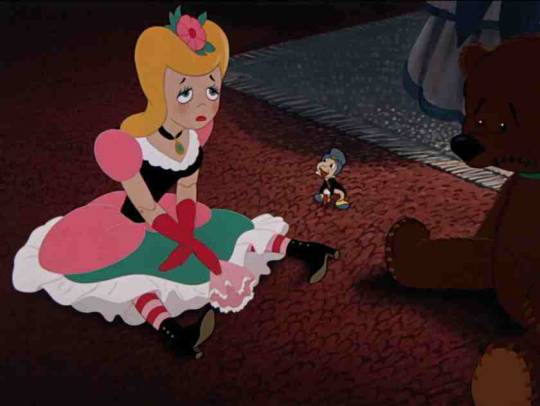
“Lemme guess, you’re wishing to become a real girl, right?” “No, I’m just disheartened by the extreme gender stereotyping that are enforced through children’s playthings and the psychological ramifications that are passed down with every generation.” “Swell!”
Jiminy’s prognosis is that these two depressed toys are in desperate need of some music and fun to cheer them up. So he whips out a record of Dinah Shore reading and singing the story of Bongo the Bear.
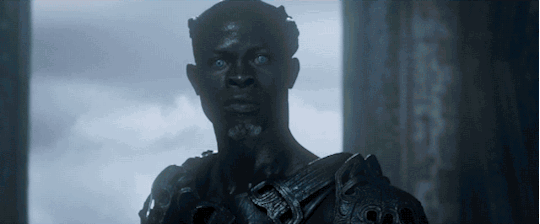

“The main character of the piece we’re about to watch, obviously.”
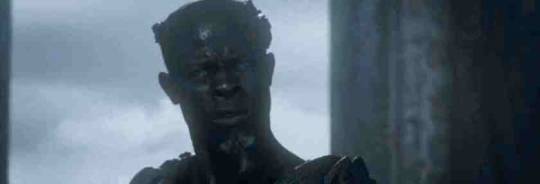
“No, I mean who the hell is Dinah Shore?”

“Ah. Gotcha.”
Dinah Shore was a popular big band singer of the 1940’s and one of the first female artists of her day to make a successful solo career for herself. She appeared on multiple popular radio shows, was a Chevrolet spokeswoman, won a total of nine Emmys for her various television shows and specials, and was romantically linked with stars ranging from Jimmy Stewart to Burt Reynolds. And remember Pee-Wee’s Christmas Special? She’s the woman who keeps popping in singing an endless rendition of The Twelve Days of Christmas that goes over the end credits.
This wasn’t Dinah’s first contribution to a Disney package film as she had lent her pipes to the titular song of the “Two Silhouettes” segment in Make Mine Music the year prior. She does fine as the narrator of this section, though there’s one teensy problem I have which I’ll get to eventually.
The record begins with Dinah Shore saying this is a story about three bears.

No, Ms. Shore spells it out for us – a girl bear, a big mean bear who wants to be her mate, but mostly of Bongo, a bear born and raised in the circus who’s the star of the show. Had this story turned out the way Walt originally envisioned, it would have been something of a crossover-sequel of Dumbo with the titular elephant and the catty matriarchal troupe of pachyderms providing cameos. I assume this fell through due to Dumbo’s salary demands being a little too far out of Walt’s price range.
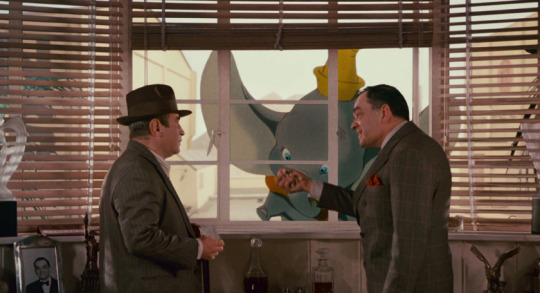
You know the war’s hit you hard when working for peanuts puts a crunch on your budget.
Bongo puts on his impressive act of juggling on a unicycle while on a high wire before making a spectacular dive. But we’re also privy to what happens when the show is over; no sooner does he back out of the tent from his curtain call than he’s manacled, hosed down, tossed into a cage and hauled off to the next state for a literal rinse and repeat. He’s the circus’ main draw, but he’s treated worse than, well, an animal.
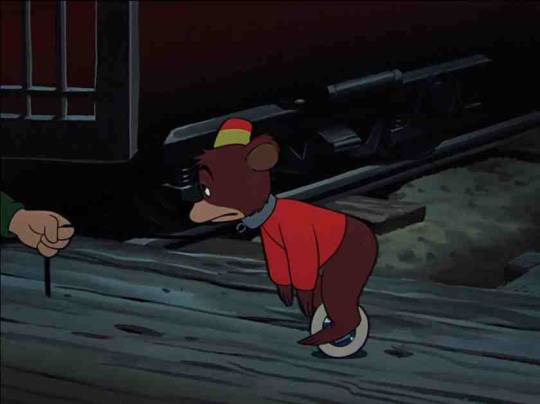
And people wonder why Ringling Bros. went out of business.
In between shows the miserable Bongo dreams of a life of freedom out in nature. We’re supposed to feel immediate sympathy for Bongo based on what we see and because Dinah Shore tells us to, but the abuse is edited so quickly and played off almost comically. They’re aiming for Dumbo’s level of emotion but we had time to get to know Dumbo and develop a connection with him. We saw him be happy, we saw him bond with his mother, we saw him befriend Timothy; almost all of that happened before he was thrust into heart wrenching drama. We barely know anything about Bongo apart from he’s a talented circus performer who’s more like a prisoner than a celebrity. Did he have a good childhood? Was his family in the same line of circus work? Does he have a favorite color?

One day the call of the wild is too loud to ignore. He escapes thanks to a very flimsy lock on the door of his train car (you think between that and how the staff treats him they’re purposefully setting up an opportunity for him to vamoose) and soon he’s zooming down the mountain on his unicycle. For the next several minutes Bongo explores his new forest surroundings and befriends the usual bevy of Disney fauna. Dinah Shore underscores Bongo’s laid back euphoria with “Lazy Countryside”, an easygoing and pleasant tune.
Unfortunately after night falls Bongo is quick to learn that the bare necessities of life will not come to you, at least not right away. Between the incessant chatter of nocturnal animals and insects keeping him awake and a storm threatening to cut his newfound life short, Bongo spends the night and most of the following morning cold, alone, and starving. His attempt at fishing like a bear should doesn’t go as hoped, but it does catch the eye of our story’s love interest, Lulabelle.
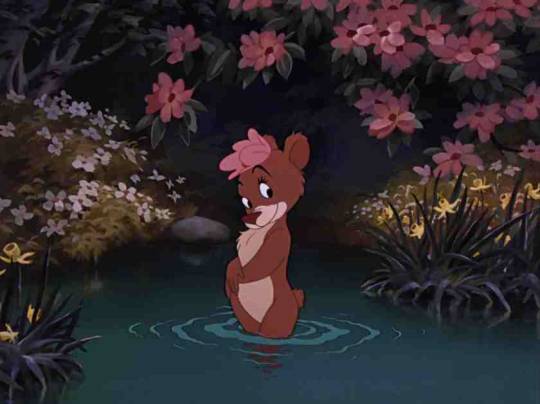
Voted “Most Likely to Awaken A New Generation of Furries” in the ’47 Disney yearbook.
I love Bongo’s reaction to seeing Lulabelle for the first time; an unmoving incredulous expression on his face as he tries to wake himself up from this vision, all the while Dinah Shore says “I must be dreaming! It’s too good to be true!” about three dozen times. The two flirt for a little while before we’re spun into the next musical number called, you guessed it, “Too Good To Be True”. It’s cute, but the floating on pink clouds, the hearts everywhere, the little cupid bears flying around, it all seems somehow familiar…
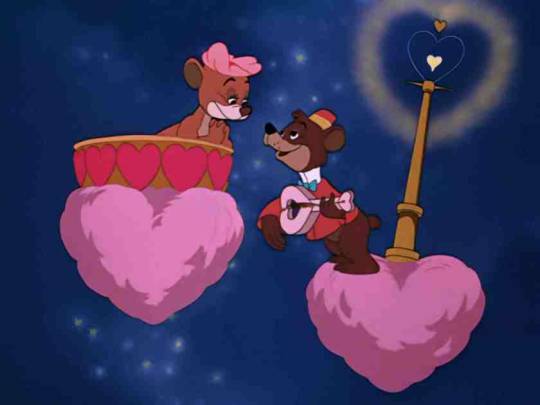
“Do the Care Bears countdown, and send a wish on to the aiiiiir…”
The song itself is nice, but there’s one that always springs to mind which I prefer. My introduction to the story of Bongo was not through a full viewing of Fun and Fancy Free or even a tape of this segment, but through DTV. See, the Disney Channel launched around the time MTV was a massive success, and wanting a little of that to rub off on them the company commissioned a series of interstitials comprised of clips from their shorts and animated films edited to classic pop, rock and blues hits and called it DTV. They basically predated the kind of fanmade music videos you see on YouTube. It was popular enough that there were even a few hour-long holiday specials built around them (mainly Valentine’s Day and Halloween). I bring this up because one of the first DTV videos I remember watching and am still fond of is Marvin Gaye and Tammi Terrell’s “Ain’t No Mountain High Enough” set to a few mountain-climbing themed shorts but primarily scenes from Bongo. And darn it, it cuts through the corniness and simply works. The imagery and overall sappiness of “Too Good To Be True” evokes every single vapid and thoroughly unsubtle Valentines Day product that is churned out en masse that time of year. No, wait, it’s not Valentines Day level of beating you over the head with glamorized romance. It’s Defcon 5, people – it’s LOVE DAY.
So Bongo and Lulabelle are happily in love, but it would make for a pretty dull short if it ended right here. Looks like we’re gonna need some more conflict to get the ball rolling. Enter our third bear, Lumpjaw, whom Dinah Shore describes as “the roughest, toughest, meanest bear with murder in his eyes”.
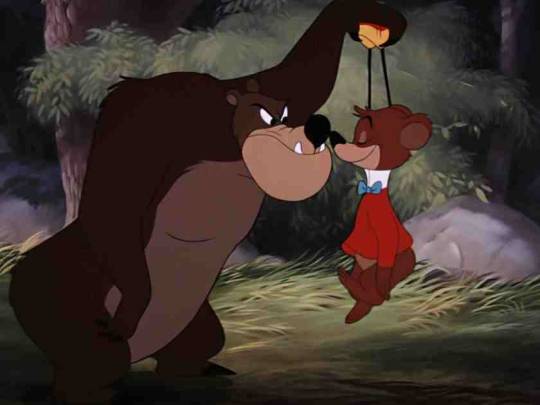
Meh, typical cartoon bear, he’s not so scar –
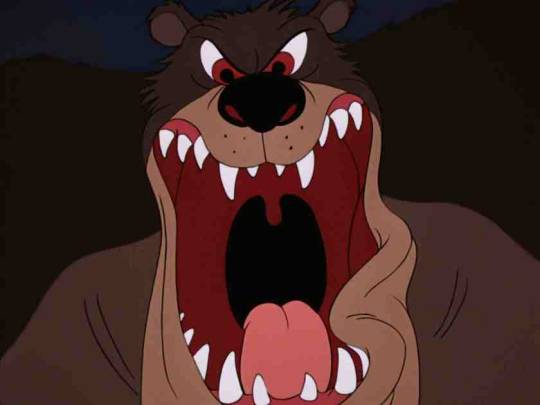
AHHHHH!! I TAKE IT BACK! I TAKE IT BACK!!
Lumpjaw is jealous that this newcomer is making moves on “his” girl, and since Bongo doesn’t know how to fight like an ordinary bear he starts getting the crud kicked out of him until Lulabelle intervenes – and slaps him silly herself.
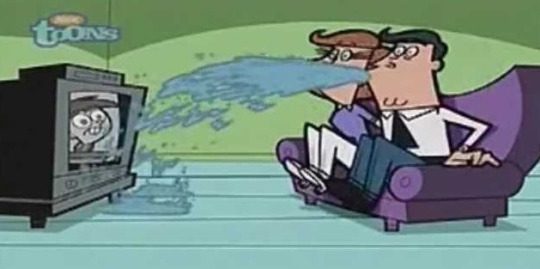
Bongo believes Lulabelle must hate him and is completely oblivious to her and the other bears watching the spectacle waiting for him to hit her back. You see in this movie, the law of the forest dictates that bears show love by hitting each other repeatedly.
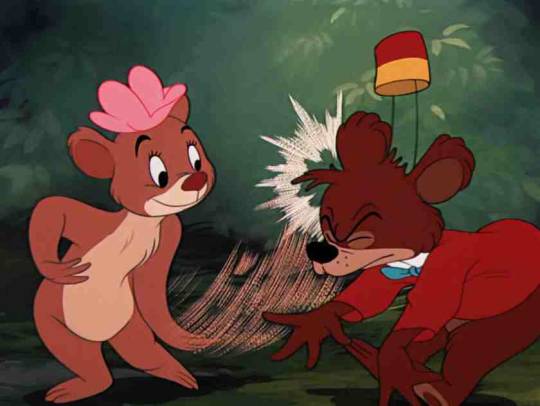
“She hit me…and it felt like a kiss…”
And oh I can already hear the wailing of “this promotes abusive relationships” through my computer screen. First off, I KNOW firsthand what an abusive relationship is, and it is more than just physical violence. That doesn’t condone violence, not one iota, but emotional/psychological abuse play a part in it as well, and Bongo is at least quick enough to recognize the smacking as what it should be, an unwarranted act of aggression that is entirely the slapper’s own fault. Second, give the kids you put this on for some fucking credit. Children’s entertainment is not one size fits all. Some might internalize this backwards logic of “hitting means love”, but others may ignore it completely. If you’re concerned that they might act out this kind of violence after watching this, just sit them down and talk to them about it instead of assuming the worst and convincing your neighborhood to toss their dvds into the nearest dumpster fire. Even if you tell them something as basic as “this is only how bears show they love each other but not how people do” they’ll be more apt to listen. Speaking of, there is some truth to this fact as bears in the mating season can get territorial and violent, hence all emphasis on the slapping. As ridiculous and horribly dated as this whole concept of this plot point is, I’ll give the story men credit that they didn’t pull it entirely from their asses.
Lulabelle doesn’t understand why Bongo isn’t hitting her back and since they can’t talk it out because the only method of communication is the narrator providing inner monologues, the usual romantic misunderstanding ensues. You know how I feel about this blasted cliche, so there’s no point dwelling on it. She tries to give Bongo one more chance with another slap, but he ducks and she hits an eager Lumpjaw instead. The other bears congratulate the two on their forthcoming nuptials while Bongo sulks off.
Then comes our next musical number performed for the half-happy couple by the tribe of bears, “Say It With a Slap”. It sounds like something you’d hear in the Country Bear Jamboree, from the background yodeling to the square dancing bridge to the subject matter being hilarious for the time and for Southerners but awkward and uncomfortable by today’s modern sensibilities. Also as far as ritualistic courtship dances go I’m more fond of the Finnish Fish Shlapping Dance myself.
Watching the festivities from afar Bongo finally puts two and two together and races back to Lulabelle. Since Bongo can’t fight Lumpjaw on the big guy’s terms he faces him like a smarter than the average circus bear and pummels him good with his unicycle. I’ll give the sequence this, it’s the most entertaining thing in this half of the picture. Maybe if this story had focused more on Bongo learning to adapt to the wild bear lifestyle and finding a middle ground between that and his circus upbringing rather than dawdle on love montages and countryside imagery this could have been a more interesting short.
The two wind up on a log on a river, and since this is an animated movie they quickly find themselves at the edge of a waterfall. Lumpjaw goes over but oh no, Bongo’s gone too – oh wait, no he isn’t, yaaaay. The bears celebrate, Bongo becomes a willing participant in Lulabelle’s masochism tango, and they live slappily ever after.
The record ends and Jiminy is pleased to see the toys are now smiling. Thrilled that he’s got two inanimate objects buying into his well-intentioned dime store philosophy, Jiminy is about to go on his way when he spies a birthday party invitation lying about and uses that as an excuse to invite himself. I’d make a complaint here about Jiminy being a gate crasher but it’s something he’s done since Pinocchio; hell, that movie kicked off with him hopping into Gepetto’s workshop uninvited looking to spend the night and messing with some of the toys there as well so nothing has changed between then and this movie.
At the house across the way is the party in question being held for Luana Patten, a Disney child star who’s also appeared in Melody Time, So Dear to My Heart, and Song of the South, usually alongside future Peter Pan Bobby Driscoll. The host is a popular ventriloquist of the day, Edgar Bergen, and his two dummies, little wiseacre Charlie McCarthy and bumbling bumpkin Mortimer Snerd. In fact, they’re the ONLY ones there. Just tell yourself Luana’s parents had to go out for the night and Bergen’s a family friend who’s babysitting and it makes this scene slightly less questionable. When Jiminy shows up, Bergen is doing one of his ventriloquism tricks for little Luana with a literal hand puppet.
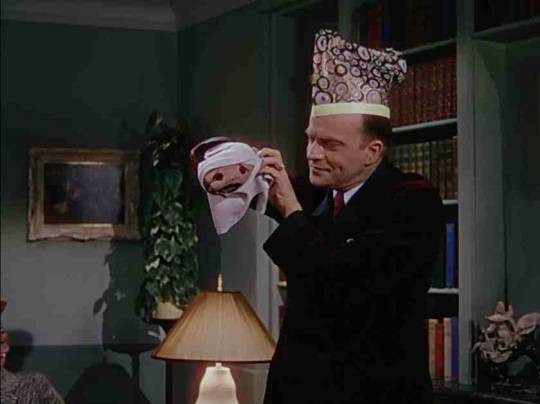
This early version of Lamb Chop’s Play Along is WEIRD.
Now this scene is something that irks a lot of people, and I understand why. Bergen is often touted as the man who popularized ventriloquism but here you see his lips constantly moving. In this kind of act what impresses people is that you’re making your puppet appear to be talking WITHOUT making it obvious that you’re the one who’s doing it. The fact that his popularity got started on the radio, where NOBODY could see him pulling this off is especially baffling. I suppose what Bergen lacked in innate talent he made up for with a good sense of comic timing and his fairly likable if simple characters. Speaking of, Charlie and Mortimer are odd to be sure, and I see why some find them off-putting with their big unblinking eyes and noticeable slits around their large mouths, but personally speaking I’ve found certain Muppets to be much creepier than these dummies. Despite all this, I can’t hate the guy or his weird looking puppets or their questionable placement in this movie.
And you wanna know why?
Because if it wasn’t for Edgar Bergen, we wouldn’t have Jim Henson.
I kid you not.
Henson was a huge fan of Bergen as a child, and it led to him wanting to become a puppeteer. I think we all know how that turned out. It’s enough that as a way of showing his appreciation to Bergen he gave him and Charlie McCarthy a cameo in The Muppet Movie and dedicated it to him after his passing.
Bergen decides to regale the company with the story of Jack and the Beanstalk. When you think about it, Jack and the Beanstalk is a hard tale to tell, not because it’s been done so many times before but because there’s so few good versions out there. Let’s get one fact straight, Jack is a TERRIBLE main character. He makes a stupid decision that nearly plunges his destitute family into further poverty, then cons and steals from an innocent housewife no less than three times and kills her husband in cold blood when he’s caught. It takes a lot to make you want to root for him, and lord knows people have tried. The Faerie Tale Theater version added a backstory where the giant was the one responsible for killing Jack’s father and stealing his family’s treasures in the first place. HBO’s Happily Ever After series and The Henson Company’s made for TV movie explored Jack’s morality by having him learn greed makes him as much of an all consuming monster as the giant. The Gene Kelly television special and the animated Japanese version both added a cursed princess in need of rescuing; the latter also went for straight out weirdness just for good measure. And then there’s the Sondheim musical Into The Woods, which told the story best by forcing Jack to face the consequences of his actions when the giant’s widow finds another beanstalk and climbs down for revenge.
So how does Disney make their version one with no questionable morals or character motives? By having their three main stars Mickey Mouse, Donald Duck and Goofy star in it, of course (if you haven’t already gotten that before). There were tons, and I mean TONS of story ideas that were tossed around when this was being developed as a full-length feature which I would have loved to have seen in the final product. One version would have had Honest John and Gideon from Pinocchio be the ones who swindle Mickey into buying the magic beans. Another one had Minnie be the queen of Happy Valley (proving that not all animated queens who don’t have ice powers have to be evil) and had her give the beans to Mickey as a way to return the dried up Happy Valley to its former glory. There were lots of gags and and creative visual concepts about the land of the giants and what would happen when the main trio got there. For a time the hen that laid golden eggs, a staple of the original story, was a part of it, and she would have been played by the now relatively obscure character of Clara Cluck! Unfortunately everything had to go when the war started and the budget got slashed. And that’s not the only thing that went with it. This short would be the last time Walt Disney would provide Mickey’s voice as his smoking habit was beginning to affect his performance. After this he would pass the torch to the studio’s sound effects wizard Jimmy McDonald.
Bergen opens the tale in the magical land of Happy Valley and we see Luana imagining it in her mind as he builds on details like babbling brooks, lush farms and a splendorous castle overlooking it all. And in that castle lives the key to Happy Valley’s success, a magical singing harp (Anita Gordon). She sings the lovely “My What a Happy Day”. I really like this song; some have told me it’s the sound of blandness, but I can’t hear them over the innocent joy it infuses me with. Maybe it’s the fact that I grew up with this particular short that makes me enjoy it so much. My VHS copy had the story narrated by beloved Wonderful World of Disney character Ludwig Von Drake with bookends featuring him and Herman the Bootle Beetle, and I watched it all the time. It was my childhood.
According to Bergen the song of the Harp casts a spell of prosperity and happiness over the land, which admittedly raises one potent question: The enchanted prosperity I can get but is the happiness a side effect, or is it enforced like that one Monty Python skit where everyone in that Happy Valley has to be happy all the time or else?
Of course the story would go nowhere if it was constantly this happy which leads into my favorite exchanges between Bergen and Charlie:
Bergen: It was too good to last – Charlie: I knew there was a catch. Bergen: For one day – Charlie: They built a schoolhouse.
Out of the blue an enormous shadow creeps over the valley like a storm cloud (complete with actual thunder and lightning too) and snatches the Harp from the castle. Without the Harp’s music Happy Valley decays into a barren wasteland that no amount of song can salvage.
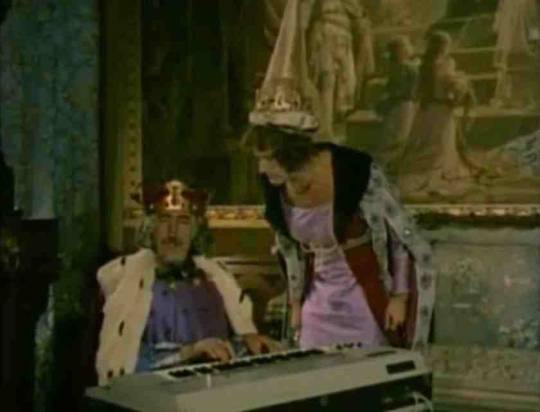
And Lord knows they’ve tried.
We check in on Mickey, Donald and Goofy, three starving farmers with nothing to their name but a dried up cow, a crust of bread they have to slice paper thin, and a solitary bean. It’s a darkly comic sight, one made even more tension-filled and humorous when it’s filtered through the narration…
…in the Von Drake version.
Yeah, while we’re on this topic I might as well go into why I prefer the one with Von Drake narrating over the original. The main problem I have with Bergen is the same I have with Dinah Shore’s voiceover in the Bongo section, yet by comparison Shore is barely a nuisance. You want to know what that is?
BERGEN.
NEVER.
SHUTS.
THE HELL.
UP.
Everything he adds to the proceedings is already plain to see before us, and when he isn’t talking about the current action on screen or trading barbs with Charlie McCarthy he’s going into what the characters must be thinking or feeling at that moment. It’s not like film is a visual medium where we can draw our own conclusions based on what we’re viewing and our prior knowledge of the characters, oh no, we have to be told everything like we’re children. Oh wait, we don’t, because I watched the Von Drake one when I was a child and I knew what was going on without him telling me every five seconds! The Von Drake edition knows when to clam up and let what’s happening speak for itself. It allows this half of the movie to breathe and lets us take in some good atmosphere and music where there was once constant voiceover. On top of that, Von Drake’s delivery hits all the comic beats while Bergen’s is rather dry. The original Mickey and the Beanstalk from Fun and Fancy Free has cleaner scene transitions as well as moments that were edited from the Von Drake edition since that was taken from television, but half the charm comes from Von Drake and Herman; that and the previously mentioned amount of narration makes their take the superior version.

“Wow…I never realized how much I needed to say all that.”
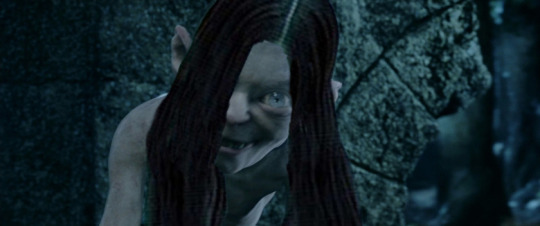
“Felt good, didn’t it?”

“You have no idea, Cynicism.”
Anyway, caught between starvation pangs and an omnipotent voice incessantly stating the obvious, Donald finally snaps and attempts to make a sandwich out of the plates and cutlery. Goofy and Mickey bring him back to his senses, or so it would seem.
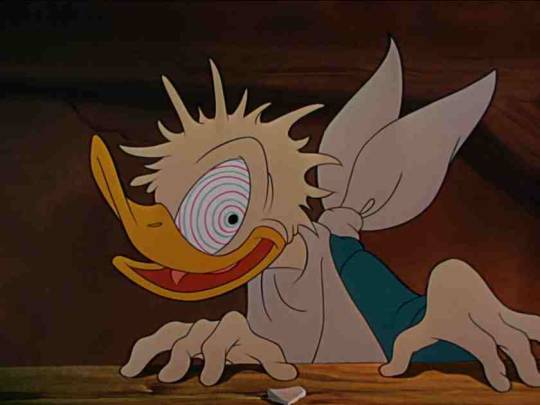
Ah, I knew this movie was lacking something – nightmare fuel!
Mickey spies the axe conveniently hanging on the wall has gone missing nearly too late. Outside Donald is making his moves on the cow.
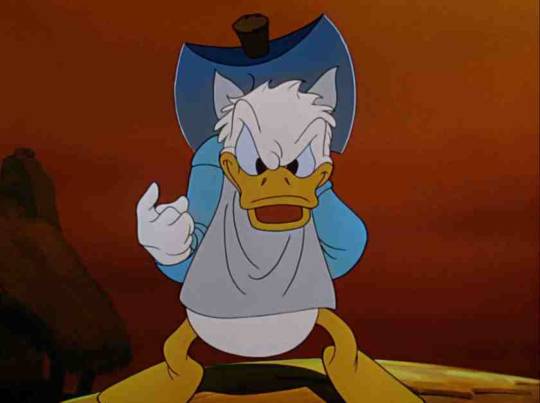
Heeeeeeere’s ducky!!
For many people this is one of the scariest moments in Disney cinema. While I’m not inclined to agree I can surely understand. His slow descent into madness is framed almost like a psychological thriller. Plus, we all know Donald’s had a temper before but we’ve never seen him flat-out attempt murder…almost.
I’d like to point out that in the picture on the left the gun is going off in a crowded theater. Unfortunately the timelessness of Disney’s films doesn’t always apply to their early shorts.
Mickey and Goofy intervene in the nick of time and the story fades back to the puppet party. Charlie is all up for Donald murdering the cow to survive and lists a number of increasingly gruesome ways to pull it off over Luana and Mortimer’s distressed protests. Ok, NOW I think I understand why everyone is terrified of Charlie McCarthy. The kid’s a little wooden sociopath.
After some more blathering, Bergen gets the story back on track and tells us Mickey went to go trade the cow for some much needed vittles. But Donald and Goofy’s dreams of a Be Our Guest style feast are dashed when he returns home with nothing but a handful of beans. Donald goes berserk even after Mickey says they’re supposed to be magic and smacks them out of his hand where they fall into a hole in the floor. Yet as everyone sleeps that night, light from the full moon shines into the house, which is the very thing needed for the beans to work their magic. The whole sequence where the beanstalk grows through the entire house and raises it up to the sky is a highlight. It begins with an almost sinister air, the beanstalk crawling its way upward and silently through the dark like a snake, and the wonder and music constantly builds as it climbs higher towards the heavens. Every action matches with the music, and the animation is the best in the whole movie. I must say it always amazed me that Mickey, Donald and Goofy are able to sleep as heavily as heavily as they do through the whole ordeal, especially since they get shaken around so much and come close to falling so many times. Were the hunger pains that bad that they took a heavy dose of Ambien before turning in?
The three wake up that morning in a land in the clouds where everything towers above them (and apparently they’re totally fine with their house being destroyed). They venture to a nearby castle where the only clue as to who lives there is a set of footprints each the size of a ditch. While crossing the moat Donald angers a formation of dragonflies and one dive bombs them. On the tape I had it was immediately swallowed by a jumping fish and the ensuing splash washed the friends to shore. So imagine my surprise the first time watching it in full and seeing this was a full-blown action sequence of sorts with the dragonfly going after them repeatedly and their little vessel nearly sinking. I’m guessing it was cut for time but it’s kind of a neat part.
Mickey and crew climb up the enormous stairs and sneak in the castle under the door, and all the while Bergen does not stop talking. I’m almost tempted to put it on mute when the animated characters aren’t the ones who are speaking. They come across a giant table laden with enormous food and gladly help themselves. Goofy in particular gets in plenty of shenanigans involving a bouncy jello mold. The gorging is cut short when they hear the voice of the Harp coming from a locked chest. She informs them that she was kidnapped by the giant Willie.
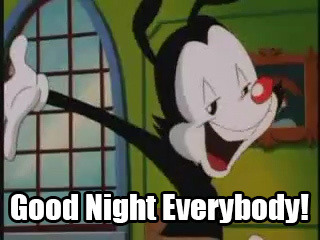
Twenty-eight years of watching this…how did I not realize… There is no way that name could have been chosen at random!
Bergen tells us Willie is “a heartless monster” who stole the Harp because “he was cruel and selfish and didn’t care what happened to Happy Valley”. And I…he…I…
No.
NO.
Screw you, Bergen.
Screw you, screw your horrible narration skills, and especially screw your picking on my Willie!


“Ugh, there’s no way around that phrasing, is there?”
Again, going back to the Von Drake edition, they painted Willie in a much kinder light, one that’s more true to his character. He’s not the crude, gluttonous, overly violent thug like past giants. He’s big enough to pose a threat but he’s silly and very endearing, almost childlike at times.
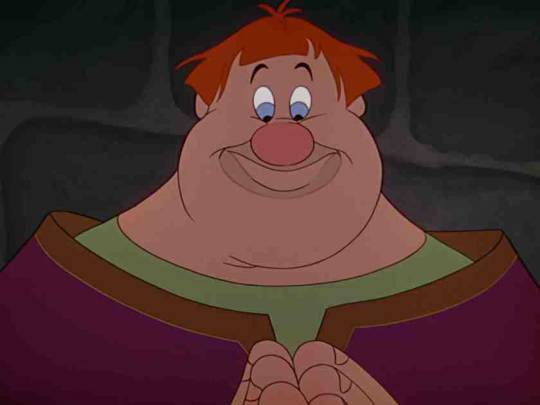
Come on, does this even look cruel, selfish and wicked to you?
His goofy voice plays a part in it as well thanks to Billy Gilbert, the same actor who voiced Sneezy in Snow White and the Seven Dwarfs. At one point he even gets to do his trademark over-the-top sneeze. Willie does not seem at all like a cold-hearted brute who would leave an entire kingdom to rot for his own selfish pleasures. It’s highly likely he didn’t even know the Harp was needed for the land to thrive and was completely ignorant to the fact that Happy Valley was turning into Death Valley without her. That’s why it bugs me when he’s lumped into the group of Disney villains. Nearly every bad guy in the canon either openly embraces how evil they are or do what they do because they believe it is the right thing. Willie falls into neither category; most of his maliciousness is incidental rather than intentional. If you don’t believe me that he isn’t evil, look at how he’s portrayed beyond this movie. In a bout of perfect casting, he plays the friendly and jovial Ghost of Christmas Present in Mickey’s Christmas Carol. He’s also made positive appearances in shows like House of Mouse and Mickey Mouse Clubhouse. Maybe it’s just because I’ve always had an affinity for big tough looking characters who are really enormous marshmallows (wait until you see who my favorite character is when we get around to reviewing the American Tail movies), but I can never see Willie as a true villain, and that’s a good thing. So back off, Bergen. He may be a big galoot, but he’s MY big galoot.
What also separates Willie from the giants in most other adaptations is that he has the ability to change himself into anything he wants provided he says or sings the magic words “Fee Fie Fo Fum”. A common complaint with this new feature is that it’s completely unnecessary; his superpower is that he’s already big and strong, so why give him magic? I disagree. I like his transformations and think it adds something special to him. Walt purposefully wanted to create a combination of the traditional beanstalk giant and the shape shifting ogre from the fairy tale Puss in Boots to add more danger and intrigue to the story (as well as eliminate the moral quandary of making a side character a widow). In fact one has to wonder if this means Walt ever planned on doing an animated take on Puss in Boots someday. My only wish is that Willie’s powers were utilized more as it was originally planned in both his song and the first draft of the ending, where he’s shrunk down to normal size and becomes a member of Queen Minnie’s court.
Willie discovers Mickey hiding out in his sandwich and snatches him. But clever Mickey has already seen Willie showcase his powers through his introductory number and pretends to learn and be impressed by that fact after reading Willie’s palm. Willie is eager to show off and Mickey, spying a flyswatter nearby, asks if he could transform himself into a housefly. Willie is of course suspicious and would rather be something like a pink bunny but goes along with it anyway. The friends prepare to attack, but Willie does the old switcheroo and exposes them.
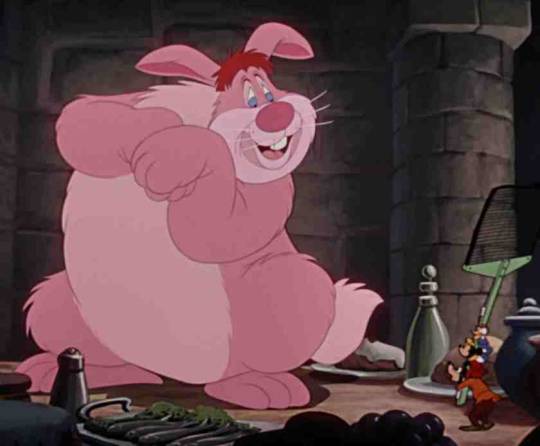
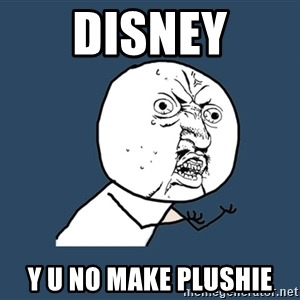
I’m guessing Mickey never bothered to actually read the original Puss in Boots story; there Puss convinces the shapeshifting ogre to turn into gradual bigger and fiercer creatures and then taunt him into becoming something small and helpless so he can dispose him. Sweat the small stuff immediately and the one you’re trying to trick will be on to you right away.
Willie captures his would-be murderers though Mickey escapes before he can get locked up with Donald and Goofy. Luckily they have an ally in the Harp, who sings Willie to sleep with the sweet lullaby “My Favorite Dream”. Mickey is able to sneak the key out of his pocket after almost waking him with an upturned box of snuff and rescues his friends. Donald and Goofy start making their way back to the beanstalk with the harp, but Mickey tries to buy them more time by tying up Willie’s shoelaces in case he wakes up. Unfortunately doing this does cause Willie to wake up and attack. There’s a surprised “Oh!” from Luana at this part that was left in on the Von Drake tape so for the longest time I assumed it was the Harp crying out in terror despite the fact that they sound nothing alike. Oops.
Mickey manages to outsmart Willie at every turn, mainly because the giant is so furious he conveniently forgot he can become anything and catch and crush Mickey like an insect at any second. The story abruptly ends with the three friends cutting down the beanstalk and Willie crashing to his death. We don’t even get to see the harp returned or Happy Valley restored or Mickey, Donald and Goofy sharing a victory high five. Mortimer’s not satisfied mainly because he’s saddened by Willie’s murder, and I don’t blame him. As if I need to repeat it, they do too good a job of making him likable that you don’t want to see him die. Bergen responds by reminding Mortimer that Willie is only a fictional character and gives him a crash course in fantasy vs. reality – one that is completely thrown out the window when the real Willie looks in on them.
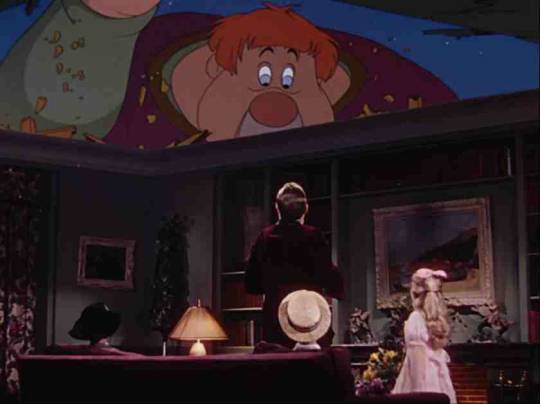

So, sentient crickets and puppets are accepted as normal as well as a living giant that everyone once believed to be fictional…
This whole movie took place near Gravity Falls.
There is no other possible explanation for this.
Bergen has the appropriate reaction and faints, Mortimer takes comfort in knowing reality is an illusion and the universe is a hologram, and Jiminy figures maybe now is a good time to get the heck out of dodge before this crossover gets any stranger. So our odd little film comes to a close as we follow Jiminy tailing Willie as he terrorizes the downtown Los Angeles area in search of the mouse who made him homeless.
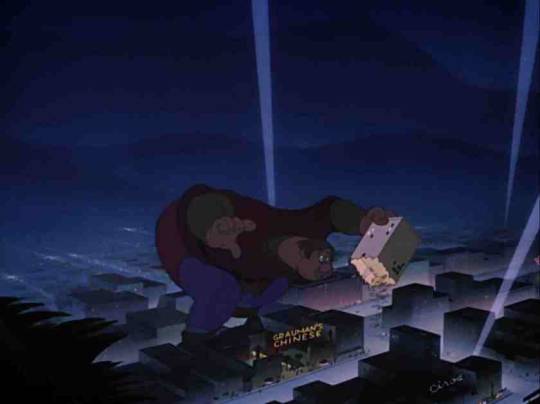
“Run!! It’s Godzilla!!” “It may look like Godzilla, but due to international copyright laws and the fact that this giant is so obviously a human whereas Godzilla is reptilian, it’s not.”
Well…that was something. Maybe not as spectacular or fully underrated as I remember, but it was something. The host parts are disjointed and don’t gel very well, even in comparison to the other package features. But the main draw at the time was less about the animation and characters and more about the celebrities that would be playing a part in it. Fun and Fancy Free basically predates the Dreamworks formula by about fifty years. Food for thought, huh?
As for my summary of the individual segments, Bongo is perfectly fine. Not amazingly humorous or gorgeously animated, but not poorly scribbled out or annoying, at least for the most part. It’s middle of the road entertainment that I don’t have much to complain about or praise. The worst I can say is that it’s as padded as my high school brassiere. Mickey and the Beanstalk, though? Never fails to give me the nostalgic warm and fuzzies. It’s a big adventure with a boatful of lovable characters and great songs. By all means though, seek out the version that has Ludwig Von Drake narrating. It’s available on dvd, and last time I checked it’s on Netflix too. It even comes with some of my favorite Mickey shorts like “Mr. Mouse Steps Out” and “Brave Little Tailor”. I know I’m not the only one who feels some connection to this part of film; whereas nobody remembers or bothers to reference Bongo, even in Disney media, there’s one or two mentions of Mickey and the Beanstalk in the Disney parks, primarily in Fantasyland. Also, take a look at these stills from the Animaniacs parody of the fairytale and tell me it wasn’t influenced by the Disney one in any way.
Fun And Fancy Free performed decently at the box office, though it was overshadowed at the time by Walt Disney’s infamous testimony at the House of Un-American Activities Committee. Now it’s merely a footnote in Disney’s history. When interviewed about the film years later, the animators openly admitted they didn’t want to work on it. Even Walt barely had anything to say about it in his interviews and biographies. It was merely an assignment they had to do in order to keep the studio afloat, hold on to their jobs, and get their mascot Mickey back in a starring role (the last one he’d really hold until Mickey’s Christmas Carol in 1983). Truth be told, the making of Fun And Fancy Free, which was included on the original VHS and DVD release, is more interesting than the film itself as a whole.
But at the end of the day, do I dislike this movie?
No, not really. I can’t call it one of my favorites, yet there are things I like about it that I wish they were allowed to expand upon. It’s an uneven film that does the best it can to be simply light and entertaining like its title. And I guess that’s why people are quick to harp (ahem) on it. Disney is capable of making great art. But just because it can doesn’t mean we should diss it when they to do something lighter and fluffier. Sometimes you need that shallow, pleasant bit of pure escapism to bolster your spirits. Do you think the animation team would have been able to get by after Walt if they didn’t make The Aristocats? Or begin recovering from the failure from The Black Cauldron without The Great Mouse Detective (which I don’t think is merely shallow filler at all, but I’m saving my thoughts for the actual review of it). I admire Disney for being able to shift gears and go from deeper subject material to goofy comic fun when need be.
In other words, when watching this particular film, just repeat to yourself “It’s just a Disney movie, I should really just relax”.
Thank you for reading. If you like what you see and want more reviews, vote for what movie you want me to look at next by leaving it in the comments or emailing me at [email protected]. Remember, you can only vote once a month. The list of movies available to vote for are under “What’s On the Shelf”.
If you want to support me and totally not get swindled into buying magic beans, please consider supporting my Patreon. It’s completely optional, you can back out any time you choose, and it comes with perks like extra votes and adding movies of your choice for future reviews. Special thanks to Amelia Jones for her contribution!
And a VERY special thank you to The Three CommentEARS for their insightful and entertaining commentary on this film which helped influence and inform this review. I’ve done some commentaries with them in the past for Pinocchio and the extended anniversary edition of Pocahontas, and they know their Disney stuff. Please go and check them out!
Caricature by Brian Slatky, 2017
June Review: Fun and Fancy Free (1947) Sigh, poor package features, why does nobody like you? Why is it that internet reviewers and Disney critics and fans always seem to give you the shaft?
#1940&039;s#Action-Adventure#adventure#animated#animated feature#animated movie#animated movie review#animated shorts#animation#beanstalk#bongo#Charlie McCarthy#Dinah Shore#Disney#disney animated#disney animated feature#disney animated movie#disney animation#disney review#Donald Duck#Edgar Bergen#Fantasy#fun and fancy free#goofy#Hollywood#Jack and the beanstalk#jiminy cricket#Luana Patten#Ludwig von drake#lulabelle
8 notes
·
View notes
Text
1x01 Pilot
No matter how many times I see this show, I always forget it starts with a text introduction. I really can’t think of many shows (miniseries not included) that do that.
In my head the show doesn’t start until Emma shows up.
Hilarious that Charming thinks calling Regina a witch is stooping to her level.
“You’ve made your vows, and now I make mine” is an underrated villain line.
The art in the book hasn’t aged well for me in particular. This show always felt like how do everything on credit card debt rather than a budget so that is probably why. Which kind of makes me question why this isn’t a series they wish to reboot or continue since that is what they are selling these days? Like the last season didn’t work because it wasn’t enough of a departure to be an actual reboot in the series. Having half the characters we know and love be different characters in Seattle facing half of the characters we didn’t know was just confusing.
I feel like season 1 is peak Jennifer’s acting. And I say that as a fan who loves her. I feel like Ginnifer’s acting is what made sure this pilot made it to air.
If there are warrants for you, and you are married, why the fuck would you be dating? And why is a guy with a wife questioning what she knows about family?!!?!?!?!?!?!!?!?!?!?!!?
Henry really showed up and said THIS IS HAPPENING! I appreciate an audacious little shit.
“Kid you got problems.” “Yep, and you’re going to fix them” They really put their best foot forward with the modern times.
Literally forgot we met Rumple in the beginning. I don’t know why I thought he was more of an episode 2 or 3 review.
And thus our savor trope is born for this series.
Never questioned this before: but if time is frozen, how are people aging? Like Henry was obviously a baby when Regina got him. He grew. How does that work?
Reggie.... complicated feelings there.
“Never giving into ones dark side accomplishes anything.” A few seasons later everyone takes a turn at being the Dark One.
“I’m not Pinocchio” Oh the feels.
“She doesn’t love me. She only pretends to” Holy fuck, Henry.
Hello Jamie Dornan. Me and the rest of your career forgot you were here.
Regina and Emma’s interactions as scared mother to birth mother make more sense to me older in life. A decade ago, it was like chill, it ain’t her fault.
Emma accidentally outing Henry about the fairy-tales is a nice touch.
I kind of what that damn horrible yellow car. The bug that would.
It’s a solid good show, but imagine the enchanted forest looking actually enchanted and not computerized. Like if they actually went to a castle to film.
Why is Geppetto in the jail?
I forgot who Jamie Dornan is supposed to be in the enchanted forest. Really cannot wrack on my brain enough to remember. Is he the big bad wolf? I remember being disappointed. However, when people say Sheriff my brain immediately thinks Emma.
I understand not giving the women who doesn’t know she is Snow White apples, but why would a kid give a teacher a pear?
Regina going full wicked witch in modern times feels good. Its not supposed to, but it does. Lana can own me.
The one thing that holds up best is the damn curse. The way those clouds roll on in. That is where the money went.
Snow really is the reason they were all saved. Snow really sacrificed her family on the hope that someday they could be together again. And Charming actually did it. There is not enough emphasis put on the power of that.
This is the best of Charming. Sword in one hand, baby in the other.
I really hate the “lets compare
pain” trope, where they think someone is actually going to come out a winner. If you aren’t Deadpool, then you all lose.
Snow smiling with a dead Charming in her arms is really just a whole image.
The logic of the show is pretty sound. Our world would be the kind of place the Wicked Witch could get her happy ending. It kind of makes the whole thing later a bit weirder, but at least we got Robin for a whole minute.
Regina is making a tactical mistake with being a bitch to Emma in the beginning. She really could have used her a source to get closer to Henry and keep Emma from reaching her savior potential.
Anyone who says “you don’t get to speak” already knows they lost their own damn argument.
The way the camera panned around Emma when she asked Regina if she loved Emma is just really quality directing. That was a great moment.
How is the guy that reached for Mary Margret's hand in the hospital before she went to see David/Charming? Is that a foreshadowing or a lost potential kind of things?
Our first Mr. Gold appearance. Legendary.
0 notes
Photo
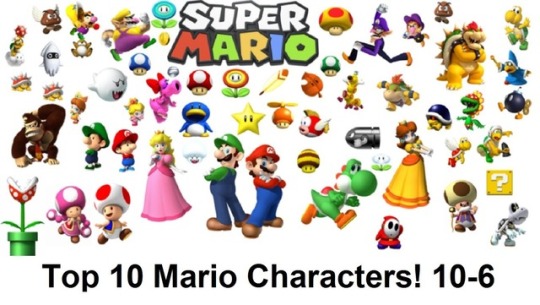
Origin of super mario names
Nintendo figures make the VR of theirs (arcade) debut with innovative Vive driven Mario Kart
Bandai Namco showed a virtual reality model of Mario Kart, Mario Kart Arcade GP VR, that is going to make its debut in a VR arcade the business is opening using Tokyo, Japan upcoming month.
The game appears to mark the VR debut of one of Nintendo's flagship franchises, although it is crucial to be aware it is licensed by Nintendo as well as created by Namco - just like its non-VR predecessor, Mario Kart Arcade GP.Not many details are currently available in English regarding the game, even thought it's mentioned about the arcade's site as running on HTC Vive headsets and specially-designed racing seats.
Nintendo has thus far been publicly reticent about the promise of VR - last calendar year frontman Shigeru Miyamoto told investors that for VR wearing specific, we're ongoing the research of ours, in addition to exploring improvement with a mind to how our existing key products are meant to be played for a somewhat long period of time of time.
We are considering the choices of delivering an adventure which gives value when played for a little while, he continued. And how to eliminate the fears of long-duration use.
When I discovered that out I did two things. To begin with, I whipped out the copy of mine (yes, I maintain it which real/nerdy that I still need a well used NES hooked up in the room) of mine and then made positive I will be able to match the game at will. (I can. Childhood not wasted.)
Secondly, I launched down a rabbit hole of reading through Mario websites and Articles and Wikis. In the operation, I stumbled upon the etymologies of the brands of several of the key players in the Mario universe. Consequently, in honor of the video game which often changed the planet, in this article they are, given in useful 11-item describe form.
Mario.
When Mario debuted in the arcade game "Donkey Kong", he was just referred to as Jumpman. (Which also is the generic label associated with that Michael Jordan spread leg Nike logo. Two of the most legendary icons actually equally have generic versions of themselves known as Jumpman. But only one of them has today gotten to a point of remaining extremely impressive that he shaved himself a Hitler mustache before filming a professional and the balls were had by no one to correct him.)
In 1980, as the Nintendo of America team imported Jumpman to raise him right into a franchise-leading star (Hayden Christensen style), somebody discovered that he looked just like their Seattle office building's landlord... a guy called Mario Segale.
Mario Segale did not get a dime for becoming the namesake of pretty much the most prominent video game persona ever, but he most likely isn't very concerned; in 1998 he sold the asphalt small business of his for over $60 million. (Or 600,000 extra lives.)
Luigi.
Luigi actually has one of probably the weakest name origins of most of the mario brothers characters in the Mario universe (once again displaying exactly why, in life that is real, he'd have a larger inferiority complex than Frank Stallone, Abel or that 3rd Manning brother).
"Luigi" is simply the result of a group of Japanese men trying to consider an Italian name to accentuate "Mario." Why was the Italian label they went with? When they each moved from Japan to Seattle, the pizza area nearby to the Nintendo headquarters called Mario & Luigi's. (It has since gone from business.)
Koopa.
Koopa is a transliterated variation of the Japanese rap for the opponent turtles, "Kuppa." Stick with me here -- kuppa is the Japanese phrase for a Korean dish known as gukbap. Basically it is a cup of soup with cereal. From what I surely explain to it's totally not related to turtles, especially malicious ones.
In an interview, Mario's creator, Shigeru Miyamoto, explained he was deciding between three different brands for the high-speed of evil turtles, all of which happened to be named after Korean foods. (The other 2 were yukhoe and bibimbap.) Which means among 2 things: (1) Miyamoto loves Korean food and was looking to offer a tribute or even (two) Miyamoto believes Koreans are evil and really should be jumped on.
Wario.
I sort of missed the debut of Wario -- he debuted in 1992, right around when I was hitting the age exactly where I was extremely cool for cartoon y Nintendo games. (Me and the middle school buddies of mine happened to be into Genesis only. I was back on Nintendo within 4 years.)
Turns out his label works both equally in Japanese and english; I kinda assumed the English fashion but did not know about the Japanese element. In English, he is an evil, bizarro world mirror image of Mario. The "M" flips to become a "W" as well as Wario is created. The name also operates in Japanese, where it is a mix of Mario and "warui," that means "bad."
That is a very high quality scenario, since, as I covered extensively in the list eleven Worst Japanese-To-English Translations In Nintendo History, not every language distinction finesses again and forth that efficiently.
Waluigi.
When I 1st seen "Waluigi" I assumed it was hilarious. While Wario was obviously a natural counterbalance to Mario, Waluigi believed really comically shoehorned (just tacking the "wa" prefix before Luigi) -- including a giant inside joke that somehow cleared every single bureaucratic step and then cracked the mainstream.
Well... according to the Nintendo folks, Waluigi isn't only a gloriously lazy choice or maybe an inside joke gone massive. They *say* it is dependant upon the Japanese phrase ijiwaru, which means "bad guy."
I don't understand. I sense that we'd have to supply them much more than halfway to buy that.
Toad.
Toad is built to look as a mushroom (or perhaps toadstool) because of his giant mushroom hat. It's a great thing the gaming systems debuted before the whole model knew how to earn penis jokes.
Anyway, in Japan, he's considered Kinopio, which happens to be a mixture of the term for mushroom ("kinoko") as well as the Japanese version of Pinocchio ("pinokio"). Those combine being something along the collections of "A Real Mushroom Boy."
Goomba.
In Japanese, the men are known as kuribo, that translates to "chestnut people." That seems sensible because, ya know, if somebody asked you "what do chestnut individuals are like?" you would probably reach something just about similar to the figures.
When they had been shipped for the American model, the team stuck with the Italian initiative of theirs and also known as them Goombas... based off of the Italian "goombah," that colloquially means something as "my fellow Italian friend." It also sort of evokes the photo of low-level mafia thugs without too many capabilities -- like individuals younger brothers and also cousins who they'd to retain the services of or perhaps mother would yell at them. That also applies to the Mario Bros. goombas.
Birdo.
Birdo has practically nothing to do with this particular initial Japanese name. Generally there, he's considered Kyasarin, which regularly translates to "Catherine."
In the teaching manual for Super Mario Bros. 2, in which Birdo debuted, the character description of his reads: "Birdo believes he is a female and likes to be known as Birdetta."
What I do believe all of this means? Nintendo shockingly chosen to create a character who battles with his gender identity and referred to as him Catherine. In the event it was some time to show up to America, they got feet that are cold so they determined at the very last minute to phone him Birdo, although he's a dinosaur. (And do not provide me the "birds are descended from dinosaurs" pop paleontology line. Not shopping for that connection.) In that way, we would just understand about his gender confusion if we read the mechanical, and the Japanese were fairly certain Americans have been either way too lazy or even illiterate to do it en masse.
Princess Toadstool/Peach.
When we all got introduced on the Princess, she was known as Princess Toadstool. I guess this made perfect sense -- Mario was set in the Mushroom Kingdom, so why wouldn't its monarch be called Princess Toadstool. Them inbreeding bluish bloods are usually naming the children of theirs immediately after the country.
Nobody seems to be certain precisely why they went the guidance, nevertheless. In Japan, she was recognized as Princess Peach from day one. That title didn't debut here until 1993, when Yoshi's Safari became available for Super Nintendo. (By the manner -- have you played Yoshi's Safari? In a bizarre twist it's a first-person shooter, the only person in the entire Mario history. It's as something like a country music superstar creating a weird rock album.)
Bowser.
In Japan, there is no Bowser. He is simply referred to as the King Koopa (or perhaps comparable variations, like Great Demon King Koopa). So just where did Bowser come from?
During the import method, there was a problem that the American masses wouldn't see how the small turtles and big bad fellow could very well definitely be known as Koopa. Thus a marketing staff developed dozens of choices for a name, they adored Bowser the best, and also slapped it on him.
In Japan, he's nevertheless hardly ever called Bowser. Over here, his title is now so ubiquitous that he is even supplanted Sha Na Na's Bowzer as America's a good number of famous Bowser.
Donkey Kong.
This's a far more literal interpretation than you think. "Kong" is based off of King Kong. "Donkey" is a family friendly method of calling him an ass. That is right: His label is an useful variation of "Ass Ape."
Super Mario Bros. is a video game launched for the household Computer and also Nintendo Entertainment System found 1985. It shifted the gameplay far from its single screen arcade predecessor, Mario Bros., along with rather showcased side-scrolling platformer quantities. Although not the original game of the Mario franchise, Super Mario Bros. is really famous, in addition to introduced many sequence staples, from power ups, to classic enemies like Goombas, to the basic premise of rescuing Princess Toadstool from King Koopa. As well as kicking off an entire compilation of Super Mario platformer online games, the untamed success of Super Mario Bros. popularized the genre to be a whole, helped revive the gaming sector once the 1983 footage game crash, and was mainly the cause of the initial good results on the NES, with that it was included a launch title. Until it was finally exceeded by Wii Sports, Super Mario Bros. was the most effective marketing videos game of all time for about three years, with more than forty million copies marketed globally.
1 note
·
View note
Photo

Origins for Super Mario Characters Name
.
When I found that out I did two things. To begin with, I whipped out the message of mine (yes, I keep it which real/nerdy which I still need a well used NES hooked up in my room) and then made confident I can still beat the game at will. (I can. Childhood not wasted.)
Secondly, I launched down a rabbit hole of looking through Mario internet sites and Wikis and Articles. In the procedure, I stumbled upon the etymologies of the brands of several of the key players in the Mario universe. So, in honor of the video game that changed the planet, in this article they're, provided in handy 11-item show form.
Mario.
When Mario debuted to the arcade game "Donkey Kong", he was only called Jumpman. (Which also actually is the generic label regarding that Michael Jordan dispersed leg Nike logo. Two of the most celebrated icons ever before both have generic versions of themselves called Jumpman. But simply at least one has nowadays arrived at the attempt of simply being extremely powerful that he shaved himself a Hitler mustache before filming a commercial and not one person had the balls to correct him.)
In 1980, as the Nintendo of America crew brought in Jumpman to lift him right into a franchise-leading star (Hayden Christensen style), an individual discovered that he looked like their Seattle office building's landlord... a guy named Mario Segale.
Mario Segale did not get yourself a dime for being the namesake of one of the most famous video game persona perhaps, however, he most likely is not excessively concerned; in 1998 he sold the asphalt small business of his for around $60 million. (Or 600,000 extra lives.)
Luigi.
Luigi has among the weakest name roots of all of the images of mario characters in the Mario universe (once again showing why, in actual life, he'd have a bigger inferiority complicated than Frank Stallone, Abel or perhaps that 3rd Manning brother).
"Luigi" is simply the result of people of Japanese males attempting to think of an Italian label to enhance "Mario." Why was that the Italian label they went with? When they each moved from Japan to Seattle, the pizza area nearby to the Nintendo headquarters referred to as Mario & Luigi's. (It has since gone from business.)
Koopa.
Koopa is a transliterated version of the Japanese rap for the enemy turtles, "Kuppa." Stick with me right here -- kuppa is the Japanese phrase for a Korean dish referred to as gukbap. Basically it's a cup of soup with rice. From what I explain to it is absolutely unrelated to turtles, especially malicious ones.
In an interview, Mario's author, Shigeru Miyamoto, claimed he was deciding between three distinct names for the race of evil turtles, all of that were called after Korean foods. (The alternative 2 were yukhoe and bibimbap.) Which means among two things: (1) Miyamoto loves Korean food and needed to offer a tribute or even (two) Miyamoto believes Koreans are evil and have to be jumped on.
Wario.
I kind of overlooked the debut of Wario -- he debuted in 1992, right around when I was hitting the generation exactly where I was way too cool for cartoon y Nintendo games. (Me and my middle school buddies have been into Genesis just. I was back on Nintendo within 4 years.)
Appears the name of his functions both equally in Japanese and english; I kinda assumed the English fashion but didn't know about the Japanese aspect. In English, he is an evil, bizarro marketplace mirror image of Mario. The "M" turns to be a "W" and also Wario is produced. The name also functions in Japanese, when it is the variety of Mario as well as "warui," which implies "bad."
That's a pretty high quality situation, since, as I covered thoroughly in the summary 11 Worst Japanese-To-English Translations In Nintendo History, not every language disparity finesses back as well as forth that smoothly.
Waluigi.
When I first read "Waluigi" I assumed it was hilarious. While Wario was an all natural counterbalance to Mario, Waluigi felt so comically shoehorned (just tacking the "wa" prefix before Luigi) -- like a giant inside joke that somehow cleared each and every bureaucratic stage and cracked the mainstream.
Well... in accordance with the Nintendo people, Waluigi is not just a gloriously lazy choice or an inside joke become massive. They *say* it's dependant upon the Japanese word ijiwaru, which means that "bad guy."
I do not understand. I think that we'd have to meet them much more than halfway to invest in that.
Toad.
Toad is made to look as a mushroom (or perhaps toadstool) because of his gigantic mushroom hat. It is a great thing these games debuted before the entire generation realized how to earn penis jokes.
Anyway, in Japan, he's named Kinopio, which is certainly a blend of the word for mushroom ("kinoko") as well as the Japanese version of Pinocchio ("pinokio"). Those blend being something around the collections of "A Real Mushroom Boy."
Goomba.
In Japanese, these guys are termed as kuribo, that means "chestnut people." That is sensible because, ya know, if someone expected you "what do chestnut people seem like?" you'd probably arrive at food roughly similar to the heroes.
When they had been brought in for the American version, the staff tangled with the Italian initiative of theirs and also referred to as them Goombas... primarily based off the Italian "goombah," which colloquially signifies something like "my fellow Italian friend." It also type of evokes the photo of low level mafia hooligans without too numerous skills -- like individuals younger brothers and cousins who they had to employ or maybe mother would yell at them. Which also applies to the Mario Bros. goombas.
Birdo.
Birdo has absolutely nothing to do with this particular first Japanese title. Right now there, he's named Kyasarin, that typically means "Catherine."
In the training manual for Super Mario Bros. 2, in which Birdo debuted, the persona description of his reads: "Birdo believes he's a girl and wants being known as Birdetta."
What I do believe all of this means? Nintendo shockingly chosen to produce a character who struggles with his gender identity and then named him Catherine. When it was time to show up to America, they got feet that are cold so they determined at the last second to telephone call him Birdo, even though he's a dinosaur. (And don't offer me the "birds are descended from dinosaurs" pop paleontology collection. Not buying that connection.) In that way, we would just understand about the gender misunderstandings of his in case we look at the manual, and the Japanese have been fairly certain Americans had been sometimes way too lazy or illiterate to do it en masse.
Princess Toadstool/Peach.
When we all got released on the Princess, she was recognized as Princess Toadstool. I guess this made good sense -- Mario was set in the Mushroom Kingdom, so why wouldn't its monarch be called Princess Toadstool. Them inbreeding bluish bloods will always be naming the children of theirs after the country.
No one seems to be sure the reason they went the guidance, however. In Japan, she was recognized as Princess Peach from day one. That title did not debut here until 1993, when Yoshi's Safari arrived on the scene for Super Nintendo. (By the manner by which -- have you played Yoshi's Safari? In an off-the-wall twist it is a first-person shooter, the only one in the entire Mario the historical past. It is like something like a country music superstar creating a weird rock album.)
Bowser.
In Japan, there is simply no Bowser. He is simply called the King Koopa (or similar variants, including Great Demon King Koopa). And so where did Bowser come from?
During the import process, there was an issue that the American crowd wouldn't recognize how the little turtles and big bad guy might definitely be named Koopa. So a marketing staff put together a large number of selections for a name, they loved Bowser the very best, as well as slapped it on him.
In Japan, he's nonetheless hardly ever referred to as Bowser. Around here, his label has become so ubiquitous that he's even supplanted Sha Na Na's Bowzer as America's most famous Bowser.
Donkey Kong.
This's a more literal interpretation than you think. "Kong" is based off of King Kong. "Donkey" is a family friendly method of calling him an ass. That's right: His name is a valuable version of "Ass Ape."
1 note
·
View note
Photo

eleven Origins of eleven Super Mario Characters' Names
The foundation on the Mario series! Would you like to come together or...or from every single other...?!
Mario Bros. is an action game released by Nintendo in 1983.
It is the first game that pre-owned "Mario" inside the distinction. Control Mario or Luigi in order to punch the foes originating out of pipes by below to transform them then and over beat them. In the two player mode, both players are able to decide to come together or even do the job alongside each other and enjoy the game within a myriad of ways.
The "Arcade Archives" sequence has faithfully reproduced a lot of standard Arcade masterpieces.
Players are able to alter various game settings such as game difficulties, plus also reproduce the ambiance of arcade screen options during that time. Players can also participate against one another coming from around the globe with their superior scores.
Please love the masterpiece that made a model for video clip games.
Can you make an a digital movie from a video recording game? That is the doubting that's answered by this specific digital movie. Mario Mario and Luigi Mario, two difficult performing plumbers discover themselves in another universe wherein evolved dinosaurs are now living in medium hi tech squalor. They end up the sole optimism to rescue the planet from invasion.
This is the story of 2 hard working Italian plumber brothers known as Mario Mario in addition to the Luigi Mario, who befriends a paleontologist known as Daisy. She uncovers a tremendous come across of mysterious brand new dinosaur bones. While examining the tunnels wherein dinosaur fossils lay, saboteurs employed by the Mario Bros. competitor businessman, Anthony Scapelli, to stop several underground water lines. Meanwhile, within a hidden planet identified as Dinohattan, King Koopa's land is close to exhausting much of its clean water and running through difficulties so he directs Spike as well as Iggy to kidnap Daisy! The Super Mario Bros. wind up the sole anticipation to rescue the environment at intrusion after that challenge a diabolical lizard king and so they have to fight gigantic reptilian goombas, outwit misfit criminals, and challenge sinister scheme by taking with the world!
Mario and Luigi, two wacky plumbers, take on a daring pursuit to avoid wasting a princess in Dinohattan -- a hidden world in which the occupants grown from dinosaurs! Luigi and Mario deal with lethal challenges from a diabolical lizard king and also should battle gigantic reptilian goombas, outwit misfit thugs, and also ruin a sinister system to take control of the world!
2 Brooklyn plumbers, Mario and Luigi, must take a trip to yet another dimension to rescue a princess from the evil dictator King Koopa and eliminate him from shooting over the world.
When I discovered that out I did 2 things. To begin with, I whipped out my copy (yes, I keep it which real/nerdy which I continue to have a well used NES connected in the room) of mine and made certain I will be able to beat the game at will. (I can. Childhood not wasted.)
Secondly, I started down a rabbit hole of looking at Mario websites as well as Wikis and Articles. In the operation, I stumbled upon the etymologies of the labels of a number of the main players in the Mario universe. Consequently, in honor of the video game that changed the globe, in this article they're, given in handy 11 item list form.
Mario.
When Mario debuted to the arcade game "Donkey Kong", he was just known as Jumpman. (Which even is the generic label regarding that Michael Jordan spread leg Nike logo. Two of the most celebrated icons actually both have generic versions of themselves known as Jumpman. But just one has today reached a point of being very powerful that he shaved himself a Hitler mustache before filming a commercial and the balls were had by no one to correct him.)
In 1980, as the Nintendo of America crew brought in Jumpman to lift him right into a franchise-leading star (Hayden Christensen style), an individual discovered that he looked like their Seattle office building's landlord... a person called Mario Segale.
Mario Segale didn't obtain a dime for being the namesake of one of the most well known video game persona perhaps, although he probably isn't too concerned; in 1998 he sold the asphalt company of his for more than $60 million. (Or 600,000 extra lives.)
Luigi.
Luigi has one of the weakest brand beginnings of most of the mario characters names in the Mario universe (once again showing why, for life that is real, he would have a greater inferiority complicated than Frank Stallone, Abel or that 3rd Manning brother).
"Luigi" is merely the result of people of Japanese males trying to consider an Italian name to enhance "Mario." Why was the Italian label they went with? When they all moved from Japan to Seattle, the pizza place nearest to the Nintendo headquarters referred to as Mario & Luigi's. (It has since gone from business.)
Koopa.
Koopa is a transliterated model of the Japanese rap for the adversary turtles, "Kuppa." Stick with me here -- kuppa is the Japanese phrase for a Korean plate called gukbap. Essentially it is a cup of soup with elmer rice. From what I definitely inform it's totally unrelated to turtles, particularly malicious ones.
In an interview, Mario's creator, Shigeru Miyamoto, stated he was deciding between three distinct names because of the high-speed of evil turtles, every one of that happened to be named after Korean foods. (The other 2 were yukhoe and bibimbap.) Which means one of two things: (1) Miyamoto adores Korean foods and needed to give it a tribute or (2) Miyamoto thinks Koreans are evil and should be jumped on.
Wario.
I kind of skipped the debut of Wario -- he debuted in 1992, right around when I was hitting the era just where I was too awesome for cartoon-y Nintendo games. (Me and the middle school buddies of mine happened to be into Genesis only. I was again on Nintendo within four years.)
Seems his title functions both in Japanese and english; I kinda assumed the English fashion but didn't know about the Japanese element. In English, he is an evil, bizarro marketplace mirror image of Mario. The "M" flips to turn into a "W" and also Wario is created. The name likewise operates in Japanese, where it's a combination of Mario as well as "warui," that indicates "bad."
That's a really excellent situation, since, as I covered extensively in the summary eleven Worst Japanese-To-English Translations In Nintendo History, only a few language significant difference finesses again and also forth quite efficiently.
Waluigi.
When I initially read "Waluigi" I assumed it was hilarious. While Wario was obviously an all natural counterbalance to Mario, Waluigi believed really comically shoehorned (just tacking the "wa" prefix before Luigi) -- including a huge inside joke that somehow cleared every single bureaucratic step and then cracked the mainstream.
Well... in accordance with the Nintendo folks, Waluigi isn't just a gloriously lazy choice or maybe an inside joke become substantial. They *say* it is based upon the Japanese word ijiwaru, which means "bad guy."
I do not understand. I sense that we would have to cater for them more than halfway to pay for that.
Toad.
Toad is built to look as a mushroom (or toadstool) thanks to the gigantic mushroom hat of his. It is a good thing the gaming systems debuted before the whole model realized how you can generate penis jokes.
Anyway, in Japan, he's considered Kinopio, which is certainly a blend of the term for mushroom ("kinoko") as well as the Japanese version of Pinocchio ("pinokio"). Those combine to be something along the collections of "A Real Mushroom Boy."
Goomba.
In Japanese, these guys are named kuribo, which translates to "chestnut people." That seems sensible because, ya know, if someone asked you "what do chestnut individuals appear to be like?" you would almost certainly arrive at food nearly like these heroes.
When they were shipped for the American model, the team tangled with the Italian initiative of theirs and known as them Goombas... primarily based off of the Italian "goombah," that colloquially means something like "my fellow Italian friend." It also type of evokes the photo of low level mafia criminals without very many competencies -- like people's younger brothers as well as cousins who they had to work with or perhaps mother would yell at them. Which also is true for the Mario Bros. goombas.
Birdo.
Birdo has nothing at all to do with this initial Japanese title. There, he's called Kyasarin, which regularly translates to "Catherine."
In the teaching manual for Super Mario Bros. two, where Birdo debuted, the character explanation of his reads: "Birdo considers he's a girl and would like for being called Birdetta."
What In my opinion all of this means? Nintendo shockingly decided to produce a character that battles with the gender identity of his and called him Catherine. In the event it was a bit of time to go to America, they got cold feet so they decided at the last second to phone him Birdo, though he's a dinosaur. (And do not offer me the "birds are descended from dinosaurs" pop paleontology line. Not buying that connection.) In that way, we'd just understand about the gender confusion of his in case we have a look at manual, and the Japanese have been pretty sure Americans had been sometimes too lazy or even illiterate to do it en masse.
Princess Toadstool/Peach.
When everyone got released on the Princess, she was recognized as Princess Toadstool. I suppose this made good sense -- Mario was set in the Mushroom Kingdom, so why would not its monarch be named Princess Toadstool. Them inbreeding blue bloods are usually naming their young children immediately after the country.
Nobody seems to be sure the reason they went the guidance, however. In Japan, she was regarded as Princess Peach from day one. The name didn't debut here until 1993, when Yoshi's Safari came out for Super Nintendo. (By the manner by which -- have you ever had Yoshi's Safari? In a bizarre twist it's a first-person shooter, the only one in the entire Mario times past. It's like something like a country music superstar making a weird rock album.)
Bowser.
In Japan, there is certainly no Bowser. He is simply known as the King Koopa (or maybe comparable variants, including Great Demon King Koopa). So exactly where did Bowser come from?
During the import procedure, there was a problem that the American masses would not recognize how the little turtles and big bad fellow could very well certainly be called Koopa. So a marketing group developed a large number of options for a name, they adored Bowser the very best, and slapped it on him.
In Japan, he's still rarely referred to as Bowser. Over here, the name of his has become so ubiquitous that he's actually supplanted Sha Na Na's Bowzer as America's a good number of prominent Bowser.
Donkey Kong.
This's a much more literal interpretation than you think. "Kong" is based off of King Kong. "Donkey" is a family friendly means of calling him an ass. That's right: His name is a valuable model of "Ass Ape."
Super Mario Bros. is a video recording game introduced for the family Computer and Nintendo Entertainment System found 1985. It shifted the gameplay away from the single-screen arcade predecessor of its, Mario Bros., and rather highlighted side scrolling platformer quantities. While not the first game of the Mario franchise, Super Mario Bros. is pretty legendary, and presented a variety of series staples, coming from power ups, to classic foes like Goombas, to the simple concept of rescuing Princess Toadstool out of King Koopa. Along with kicking above an entire series of Super Mario platformer video games, the untamed success of Super Mario Bros. popularized the genre as an entire, really helped revive the gaming sector as soon as the 1983 clip game crash, and also was largely the cause of the original success around the NES, with that it was bundled a launch name. Until eventually it had been eventually exceeded by Wii Sports, Super Mario Bros. was the very best marketing videos game of all of the time for almost three decades, with over forty thousand copies marketed globally.
1 note
·
View note
Photo

How were chosen the Names for Super Mario
.
When I discovered that out I did 2 things. For starters, I whipped out the copy of mine (yes, I ensure that it stays which real/nerdy which I continue to have a well used NES hooked up in my room) and made positive I will be able to match the game at will. (I can. Childhood not wasted.)
Secondly, I initiated down a rabbit hole of looking at Mario internet sites as well as Articles and Wikis. In the procedure, I stumbled upon the etymologies of the labels of a number of the key players in the Mario universe. So, in honor of the video game which often changed the planet, right here they're, presented in handy 11 item describe form.
Mario.
When Mario debuted in the arcade game "Donkey Kong", he was simply known as Jumpman. (Which additionally is actually the generic name regarding that Michael Jordan dispersed leg Nike logo. 2 of the most legendary icons ever before each have generic versions of themselves called Jumpman. But simply at least one has today arrived at the effort of simply being very impressive that he shaved himself a Hitler mustache before filming a business and the balls were had by nobody to fix him.)
In 1980, as the Nintendo of America team brought in Jumpman to raise him straight into a franchise-leading star (Hayden Christensen style), somebody seen that he looked like their Seattle office building's landlord... a guy named Mario Segale.
Mario Segale didn't obtain a cent for being the namesake of one of the most famous video game persona perhaps, but he probably is not too concerned; in 1998 he sold the asphalt small business of his for around $60 million. (Or 600,000 increased lives.)
Luigi.
Luigi has one of the weakest name roots of all of the nintendo mario characters in the Mario universe (once again displaying precisely why, for life that is real, he would have a greater inferiority complicated compared to Frank Stallone, Abel or even that last Manning brother).
"Luigi" is simply the product of a group of Japanese males working to imagine an Italian brand to enhance "Mario." Why was the Italian name they went with? When they each moved from Japan to Seattle, the pizza area nearby to the Nintendo headquarters referred to as Mario & Luigi's. (It has since gone from business.)
Koopa.
Koopa is a transliterated variation of the Japanese rap for the opponent turtles, "Kuppa." Stick with me right here -- kuppa is the Japanese word for a Korean dish known as gukbap. Basically it's a cup of soup with grain. From what I surely explain to it is absolutely not related to turtles, particularly malicious ones.
In an interview, Mario's author, Shigeru Miyamoto, stated he was deciding between 3 names that are distinct due to the racing of evil turtles, each one of which were called after Korean foods. (The other 2 were yukhoe and bibimbap.) Which means one of 2 things: (one) Miyamoto loves Korean foods and was looking to provide it with a tribute or (two) Miyamoto thinks Koreans are evil and should be jumped on.
Wario.
I sort of overlooked the debut of Wario -- he debuted in 1992, right around when I was hitting the age just where I was way too awesome for cartoon y Nintendo games. (Me and the middle school buddies of mine were into Genesis only. I was back again on Nintendo within 4 years.)
Seems the title of his operates both in english and Japanese; I kinda assumed the English manner but did not know about the Japanese element. In English, he is an evil, bizarro community mirror image of Mario. The "M" turns to turn into a "W" and Wario is created. The name also operates in Japanese, where it's a combination of Mario and "warui," that means "bad."
That's a pretty good scenario, since, as I covered thoroughly in the list eleven Worst Japanese-To-English Translations In Nintendo History, don't assume all language distinction finesses back as well as forth very smoothly.
Waluigi.
When I initially seen "Waluigi" I assumed it was hilarious. While Wario was obviously a natural counterbalance to Mario, Waluigi felt extremely comically shoehorned (just tacking the "wa" prefix before Luigi) -- like a huge inside joke that somehow cleared every single bureaucratic phase and cracked the mainstream.
Well... based on the Nintendo folks, Waluigi isn't just a gloriously idle choice or perhaps an inside joke gone huge. They *say* it is based upon the Japanese word ijiwaru, which means "bad guy."
I do not know. I think that we would have to meet them much more than halfway to invest in that.
Toad.
Toad is designed to look like a mushroom (or maybe toadstool) because of the massive mushroom hat of his. It's a good thing the gaming systems debuted before the entire generation understood how you can earn penis jokes.
Anyway, in Japan, he's named Kinopio, which is a blend of the term for mushroom ("kinoko") as well as the Japanese variant of Pinocchio ("pinokio"). Those blend to be something along the collections of "A Real Mushroom Boy."
Goomba.
In Japanese, these men are referred to as kuribo, that results in "chestnut people." That seems sensible because, ya know, if another person asked you "what do chestnut folks appear to be like?" you'd most likely arrive at something nearly like the heroes.
When they had been imported for the American model, the staff tangled with the Italian initiative of theirs and also known as them Goombas... based off the Italian "goombah," that colloquially means something as "my fellow Italian friend." Furthermore, it type of evokes the picture of low-level mafia hooligans without too a lot of competencies -- such as individuals younger brothers and also cousins who they had to retain the services of or perhaps mom would yell at them. That also is true for the Mario Bros. goombas.
Birdo.
Birdo has nothing at all to do with this original Japanese name. Generally there, he's called Kyasarin, which translates to "Catherine."
In the training manual for Super Mario Bros. two, where Birdo debuted, the character explanation of his reads: "Birdo considers he's a girl and would like to be called Birdetta."
What I believe this all means? Nintendo shockingly decided to develop a character that struggles with his gender identity and then called him Catherine. When it was a bit of time to show up to America, they have cold feet so they decided at the last minute to phone him Birdo, even though he's a dinosaur. (And don't provide me the "birds are descended from dinosaurs" pop paleontology series. Not buying that connection.) In that way, we would only understand about his gender misunderstandings in case we have a look at mechanical, and the Japanese were convinced Americans were either way too idle or perhaps illiterate to do it en masse.
Princess Toadstool/Peach.
When everyone got released to the Princess, she was recognized as Princess Toadstool. I guess this made sense -- Mario was put in the Mushroom Kingdom, so why would not its monarch be called Princess Toadstool. Them inbreeding blue bloods are always naming their children after the country.
No person appears to be sure the reason they went the direction, however. In Japan, she was known as Princess Peach from day one. The term didn't debut here until 1993, when Yoshi's Safari became available for Super Nintendo. (By the way -- have you played Yoshi's Safari? In an unconventional twist it's a first-person shooter, the only person in the entire Mario history. It's like something like a country music superstar putting out a weird rock album.)
Bowser.
In Japan, there's certainly no Bowser. He is simply referred to as the King Koopa (or maybe similar variations, including Great Demon King Koopa). So where did Bowser come from?
During the import approach, there was a problem that the American crowd would not understand how the little turtles and big bad man might certainly be known as Koopa. Thus a marketing team developed a large number of choices for a title, they liked Bowser the very best, and slapped it on him.
In Japan, he's nonetheless rarely known as Bowser. Over here, the title of his has become so ubiquitous that he is even supplanted Sha Na Na's Bowzer as America's most famous Bowser.
Donkey Kong.
This's a far more literal interpretation than you think. "Kong" is based off King Kong. "Donkey" is a family friendly means of calling him an ass. That's right: The label of his is an useful variation of "Ass Ape."
1 note
·
View note
Photo

Name origins for Super Mario Characters
Nintendo characters make their VR (arcade) debut with new Vive-driven Mario Kart
Bandai Namco revealed a virtual reality version of Mario Kart, Mario Kart Arcade GP VR, that is going to make the debut of its over a VR arcade the company is opening using Tokyo, Japan following month.
The game appears to draw the VR debut of 1 of Nintendo's flagship franchises, though it is crucial to observe it's licensed by Nintendo and also developed by Namco - the same as the non VR predecessor of its, Mario Kart Arcade GP.Not many specifics are still available in English about the game, however, it's listed about the arcade's site as running on HTC Vive headsets and also specially designed racing seats.
Nintendo has so far been publicly reticent around the promise of VR - last calendar year frontman Shigeru Miyamoto told investors that for VR in specific, we are continuing the homework of ours, along with looking into enhancement with a head to the way our present main products are intended to be played for a somewhat lengthy time period of time.
We're considering the possibilities of supplying an adventure which gives value when played for a little while, he continued. And the way to eradicate the issues of long-duration use.
When I found that out I did two things. For starters, I whipped out my message (yes, I ensure that it stays that real/nerdy that I still have an old NES connected in the room) of mine and then made positive I can still match the game at will. (I can. Childhood not wasted.)
Secondly, I started down a rabbit hole of reading through Mario internet sites and Articles and Wikis. In the procedure, I stumbled upon the etymologies of the brands of a few of the major players in the Mario universe. Therefore, in honor of the video game that changed the world, right here they are, presented in handy 11-item describe form.
Mario.
When Mario debuted in the arcade game "Donkey Kong", he was simply called Jumpman. (Which even is the generic brand regarding that Michael Jordan dispersed leg Nike logo. Two of the most celebrated icons ever both have generic versions of themselves known as Jumpman. But simply one has today reached the effort of simply being so effective that he shaved himself a Hitler mustache prior to filming a professional and not one person had the balls to correct him.)
In 1980, as the Nintendo of America crew brought in Jumpman to elevate him into a franchise-leading star (Hayden Christensen style), an individual discovered that he looked just like their Seattle office building's landlord... a fellow known as Mario Segale.
Mario Segale didn't get a dime for being the namesake of essentially the most well known video game character by chance, although he most likely is not absurdly concerned; in 1998 he sold the asphalt company of his for more than $60 million. (Or 600,000 increased lives.)
Luigi.
Luigi has among probably the weakest name origins of most of the mario characters list in the Mario universe (once again displaying precisely why, for life which is real, he would have a greater inferiority complex than Frank Stallone, Abel or even that third Manning brother).
"Luigi" is merely the product of a team of Japanese males trying to imagine an Italian label to enhance "Mario." Why was the Italian brand they went with? When they each moved from Japan to Seattle, the pizza spot nearest to the Nintendo headquarters referred to as Mario & Luigi's. (It has since gone out of business.)
Koopa.
Koopa is a transliterated variation of the Japanese name for the opponent turtles, "Kuppa." Stick with me right here -- kuppa is the Japanese phrase for a Korean dish known as gukbap. Basically it is a cup of soup with rice. From what I will inform it is totally not related to turtles, especially malicious ones.
In an interview, Mario's originator, Shigeru Miyamoto, said he was deciding between 3 different brands due to the race of evil turtles, every one of that were called after Korean foods. (The alternative two were yukhoe and bibimbap.) Which means among two things: (1) Miyamoto adores Korean food and needed to provide it with a tribute or (two) Miyamoto considers Koreans are evil and should be jumped on.
Wario.
I sort of skipped the debut of Wario -- he debuted in 1992, right around when I was hitting the generation where I was too awesome for cartoon y Nintendo games. (Me and my middle school buddies happened to be into Genesis only. I was again on Nintendo within four years.)
Appears his label operates both equally in Japanese and english; I kinda assumed the English manner but didn't know about the Japanese feature. In English, he is an evil, bizarro world mirror image of Mario. The "M" turns to become a "W" as well as Wario is produced. The name likewise functions in Japanese, wherever it's the variety of Mario as well as "warui," which implies "bad."
That's a pretty excellent scenario, since, as I covered extensively in the list 11 Worst Japanese-To-English Translations In Nintendo History, only a few language difference finesses back as well as forth quite efficiently.
Waluigi.
When I first read "Waluigi" I believed it was hilarious. While Wario became an all natural counterbalance to Mario, Waluigi felt so comically shoehorned (just tacking the "wa" prefix before Luigi) -- including a huge inside joke that somehow cleared every single bureaucratic phase and after that cracked the mainstream.
Well... in accordance with the Nintendo individuals, Waluigi isn't only a gloriously lazy decision or an inside joke become massive. They *say* it is based upon the Japanese phrase ijiwaru, which means "bad guy."
I do not understand. I feel like we'd have to cater for them much more than halfway to get that.
Toad.
Toad is designed to look as a mushroom (or maybe toadstool) because of the massive mushroom hat of his. It is a great thing the gaming systems debuted before the whole generation realized how to generate penis jokes.
Anyway, in Japan, he's named Kinopio, which is a combination of the term for mushroom ("kinoko") as well as the Japanese variant of Pinocchio ("pinokio"). Those blend being something along the collections of "A Real Mushroom Boy."
Goomba.
In Japanese, the men are known as kuribo, which results in "chestnut people." That is sensible because, ya know, if somebody requested you "what do chestnut individuals appear to be like?" you would most likely get to food just about similar to these heroes.
Once they had been brought in for the American version, the staff stuck with their Italian initiative and also referred to as them Goombas... primarily based off of the Italian "goombah," that colloquially will mean something as "my fellow Italian friend." It also sort of evokes the photo of low-level mafia criminals without too a lot of skills -- such as people's younger brothers as well as cousins who they'd to retain the services of or maybe mother would yell at them. That also applies to the Mario Bros. goombas.
Birdo.
Birdo has nothing to do with this first Japanese name. Generally there, he's called Kyasarin, that translates to "Catherine."
In the training manual for Super Mario Bros. two, where Birdo debuted, the character explanation of his reads: "Birdo considers he is a girl and additionally would like being named Birdetta."
What I think all this means? Nintendo shockingly decided to generate a character that struggles with the gender identity of his and referred to as him Catherine. In the event it was some time to show up to America, they have feet that are cold so they determined at the very last minute to call him Birdo, though he's a dinosaur. (And don't give me the "birds are descended from dinosaurs" pop paleontology series. Not shopping for that connection.) That way, we'd just know about the gender confusion of his if we look at the mechanical, and the Japanese had been confident Americans had been either way too lazy or illiterate to do it en masse.
Princess Toadstool/Peach.
When we all got introduced on the Princess, she was regarded as Princess Toadstool. I suppose this made perfect sense -- Mario was set in the Mushroom Kingdom, so why wouldn't its monarch be called Princess Toadstool. Them inbreeding blue bloods are always naming the children of theirs after the country.
No person appears to be certain why they went that guidance, nevertheless. In Japan, she was known as Princess Peach from day one. That name didn't debut here until 1993, when Yoshi's Safari came out for Super Nintendo. (By the way -- have you ever played Yoshi's Safari? In a bizarre twist it's a first-person shooter, the only woman in the entire Mario times past. It's like the equivalent of a country music superstar producing a weird rock album.)
Bowser.
In Japan, there's simply no Bowser. He is simply known as the King Koopa (or perhaps comparable variations, including Great Demon King Koopa). And so just where did Bowser come from?
During the import procedure, there was a concern that the American crowd would not see how the small turtles and big bad fellow could certainly be named Koopa. Thus a marketing team developed dozens of options for a title, they loved Bowser the very best, and also slapped it on him.
In Japan, he is nonetheless hardly ever called Bowser. Over here, the name of his is now very ubiquitous that he's actually supplanted Sha Na Na's Bowzer as America's many famous Bowser.
Donkey Kong.
This's a far more literal interpretation than you think. "Kong" is based off King Kong. "Donkey" is a family friendly way of calling him an ass. That's right: The label of his is an useful version of "Ass Ape."
Great Mario Bros. is a video game released for the family Computer and also Nintendo Entertainment System contained 1985. It shifted the gameplay away from the single-screen arcade predecessor of its, Mario Bros., in addition to instead highlighted side scrolling platformer concentrations. Although not the very first game on the Mario franchise, Super Mario Bros. is the most legendary, along with launched many set staples, coming from power ups, to timeless enemies like Goombas, to the standard idea of rescuing Princess Toadstool from King Koopa. Along with kicking above an entire series of Super Mario platformer video games, the untamed results of Super Mario Bros. made popular the genre as an entire, helped revive the gaming sector after the 1983 video game crash, as well as was largely the cause of the first good results of the NES, with which it was included a launch title. Until it was finally exceeded by Wii Sports, Super Mario Bros. was the best marketing videos game of all of time for nearly three years, with more than 40 million duplicates marketed overseas.
1 note
·
View note
Photo

How had been selected the Names for Super Mario
The origin of the Mario sequence! Would you like to come together or...or against each and every other...?!
Mario Bros. is an action game produced by Nintendo found 1983.
It's the original game which pre-owned "Mario" in the title. Control Mario or Luigi to be able to value the adversaries coming out of pipes from underneath to convert them over and then conquer them. Inside the two-player setting, each players can choose to work together or do the job against each other as well as enjoy the game within many ways.
The "Arcade Archives" sequence has faithfully reproduced numerous standard Arcade masterpieces.
Players can alter various game options like game difficulty, plus likewise reproduce the aura of arcade display settings during that time. Players can also compete against one another from all over the world because of their superior scores.
Please love the masterpiece which built a version for footage games.
Could you produce a film from a video game? That is the doubting that's answered by this movie. Mario Mario in addition to the Luigi Mario, two hard performing plumbers find out themselves inside a different universe where grown dinosaurs live in medium hi-tech squalor. They find themselves the sole anticipation to save the environment from your invasion.
This is the story of two hard-working Italian plumber brothers named Mario Mario as well as Luigi Mario, exactly who befriends a paleontologist named Daisy. An enormous get of mystical brand new dinosaur bones are uncovered by her. While examining the tunnels wherein dinosaur fossils lay, saboteurs selected with the Mario Bros. rival businessman, Anthony Scapelli, to break some underground piping. Meanwhile, within a secret planet identified as Dinohattan, King Koopa's farm land is close to exhausting much of its clean water and running through difficulties thus he transmits Spike along with Iggy to kidnap Daisy! The Super Mario Bros. find themselves the only real hope to save the earth from intrusion then challenge a diabolical lizard king and so they need to fight giant reptilian goombas, outwit misfit criminals, and also challenge sinister scheme by taking of the world!
Luigi and Mario, two wacky plumbers, tackle a daring pursuit in order to save a princess inside Dinohattan -- a hidden earth where the inhabitants developed from dinosaurs! Mario and Luigi deal with dangerous challenges from a diabolical lizard king and also must battle gigantic reptilian goombas, outwit misfit criminals, and ruin a sinister system to take control of the world!
2 Brooklyn plumbers, Luigi and Mario, should travel to yet another dimension to rescue a princess from the evil dictator King Koopa and stop him from shooting over the world.
When I found that out I did 2 things. For starters, I whipped out my copy (yes, I maintain it that real/nerdy which I still need an older NES hooked up in my room) and made confident I will be able to match the game at will. (I can. Childhood not wasted.)
Secondly, I started down a rabbit hole of looking through Mario websites as well as Articles and Wikis. In the process, I stumbled upon the etymologies of the labels of a few of the key players in the Mario universe. Therefore, in honor of the video game that changed the globe, in this article they're, given in useful 11-item list form.
Mario.
When Mario debuted in the arcade game "Donkey Kong", he was simply known as Jumpman. (Which additionally actually is the generic name associated with that Michael Jordan dispersed leg Nike logo. Two of the most celebrated icons ever before each have generic versions of themselves referred to as Jumpman. But simply at least one has nowadays gotten to a point of being extremely effective that he shaved himself a Hitler mustache prior to filming a business and the balls were had by nobody to correct him.)
In 1980, as the Nintendo of America crew shipped Jumpman to elevate him right into a franchise-leading star (Hayden Christensen style), an individual discovered that he looked just like their Seattle office building's landlord... a guy named Mario Segale.
Mario Segale didn't get yourself a cent for turning out to be the namesake of pretty much the most well known video game character perhaps, however, he most likely isn't absurdly concerned; in 1998 he sold the asphalt small business of his for over sixty dolars million. (Or 600,000 extra lives.)
Luigi.
Luigi has one of probably the weakest name roots of all of the mario princesses in the Mario universe (once again displaying precisely why, in actual life, he would have a greater inferiority complicated compared to Frank Stallone, Abel or that third Manning brother).
"Luigi" is merely the product of a team of Japanese guys attempting to consider an Italian brand to accentuate "Mario." Why was that the Italian brand they went with? When they all moved from Japan to Seattle, the pizza place nearby to the Nintendo headquarters known as Mario & Luigi's. (It has since gone out of business.)
Koopa.
Koopa is a transliterated model of the Japanese name for the enemy turtles, "Kuppa." Stick with me here -- kuppa is the Japanese phrase for a Korean recipe called gukbap. Essentially it is a cup of soup with cereal. From what I definitely tell it is completely unrelated to turtles, particularly malicious ones.
In an interview, Mario's creator, Shigeru Miyamoto, explained he was deciding between three brands which are distinct because of the race of evil turtles, each one of which have been named after Korean foods. (The alternative two were yukhoe and bibimbap.) And that means among 2 things: (1) Miyamoto adores Korean foods and was looking to offer a tribute or even (2) Miyamoto believes Koreans are evil and have to be jumped on.
Wario.
I sort of overlooked the debut of Wario -- he debuted in 1992, right around when I was hitting the age where I was too awesome for cartoon y Nintendo games. (Me and the middle school buddies of mine happened to be into Genesis only. I was again on Nintendo within four years.)
Appears the name of his works both in english and Japanese; I kinda assumed the English manner but didn't know about the Japanese feature. In English, he's an evil, bizarro community mirror image of Mario. The "M" turns to turn into a "W" and Wario is produced. The name also works in Japanese, when it's a combination of Mario and "warui," that indicates "bad."
That's a really great scenario, since, as I covered thoroughly in the summary 11 Worst Japanese-To-English Translations In Nintendo History, don't assume all language difference finesses back as well as forth as efficiently.
Waluigi.
When I initially seen "Waluigi" I thought it was hilarious. While Wario became an all natural counterbalance to Mario, Waluigi felt really comically shoehorned (just tacking the "wa" prefix before Luigi) -- like a giant inside joke that somehow cleared every bureaucratic step and then cracked the mainstream.
Well... in accordance with the Nintendo folks, Waluigi is not only a gloriously lazy choice or perhaps an inside joke gone huge. They *say* it is based upon the Japanese phrase ijiwaru, meaning "bad guy."
I don't understand. I sense that we would have to supply them more than halfway to get that.
Toad.
Toad is built to look like a mushroom (or toadstool) thanks to the gigantic mushroom hat of his. It is a good thing these gaming systems debuted before the entire generation understood the right way to generate penis jokes.
Anyway, in Japan, he's called Kinopio, which is certainly a mixture of the word for mushroom ("kinoko") as well as the Japanese version of Pinocchio ("pinokio"). Those blend to be something along the lines of "A Real Mushroom Boy."
Goomba.
In Japanese, these men are defined as kuribo, that results in "chestnut people." That is sensible because, ya know, if another person expected you "what do chestnut individuals appear to be like?" you'd probably arrive at something nearly similar to these heroes.
Once they had been brought in for the American version, the team tangled with their Italian initiative and known as them Goombas... based off of the Italian "goombah," that colloquially will mean anything as "my fellow Italian friend." Furthermore, it type of evokes the photo of low-level mafia criminals without very a lot of expertise -- like people's younger brothers and cousins who they had to employ or maybe mother would yell at them. That also is true for the Mario Bros. goombas.
Birdo.
Birdo has nothing to do with this original Japanese title. There, he's named Kyasarin, that typically results in "Catherine."
In the instruction manual for Super Mario Bros. 2, in which Birdo debuted, his character explanation reads: "Birdo thinks he is a woman and additionally wants being called Birdetta."
What I believe this all means? Nintendo shockingly chosen to develop a character who battles with the gender identity of his and then referred to as him Catherine. In the event it was time to show up to America, they got feet which are cold so they determined at the last minute to telephone call him Birdo, even though he's a dinosaur. (And do not offer me the "birds are descended from dinosaurs" pop-paleontology line. Not purchasing that connection.) In that way, we would only understand about the gender confusion of his in case we have a look at mechanical, and the Japanese had been fairly certain Americans had been sometimes too lazy or perhaps illiterate to accomplish that en masse.
Princess Toadstool/Peach.
When everyone got released on the Princess, she was recognized as Princess Toadstool. I assume this made good sense -- Mario was put in the Mushroom Kingdom, so why would not its monarch be named Princess Toadstool. Them inbreeding bluish bloods are usually naming the kids of theirs after the country.
No person appears to be sure precisely why they went the direction, however. In Japan, she was known as Princess Peach from day one. The title didn't debut here before 1993, when Yoshi's Safari arrived on the scene for Super Nintendo. (By the manner by which -- have you ever played Yoshi's Safari? In an off-the-wall twist it is a first-person shooter, the only woman in the whole Mario times past. It is like something like a country music superstar creating a weird rock album.)
Bowser.
In Japan, there is simply no Bowser. He is simply called the King Koopa (or similar variants, including Great Demon King Koopa). And so exactly where did Bowser come from?
During the import process, there was a problem that the American masses wouldn't understand how the small turtles and big bad gentleman could very well both be named Koopa. Thus a marketing staff developed a large number of selections for a title, they adored Bowser the best, and slapped it on him.
In Japan, he is still hardly ever known as Bowser. Over here, the name of his is now very ubiquitous that he's actually supplanted Sha Na Na's Bowzer as America's most well known Bowser.
Donkey Kong.
This is a much more literal interpretation than you think. "Kong" is based off King Kong. "Donkey" is a family-friendly means of calling him an ass. That's right: The name of his is an useful model of "Ass Ape."
.
1 note
·
View note